The website uses Cookies and other relevant technologies to optimize services. To provide you with a better experience, if you continue to use our site, you are consenting with our use of Cookies. The website can also find scenic spots for users. To activate and utilize this AI-based service, please allow the site to acquire your location first.

Tourism Administration, Republic of China (Taiwan)-Taiwan Tourism Administration's Taiwan Tourism Information Website
- Copyright Notice
- Tourism Administration
- Bahasa Melayu
- Bahasa Indonesia
- Travel Guide
Arrival & Departure
- Decrease font size
- Increase font size
Restrictions on Entering Taiwan: National Immigration Agency - Restrictions on Entering Taiwan (Chinese)
For the latest Taiwan entry/exit and quarantine information, please refer to the website of the Taiwan Centers for Disease Control, Ministry of Health and Welfare: Taiwan Center for Disease Control - Border Quarantine
Updated COVID-19 Response Actions
From August 15, 2023:
- If you have suspected symptoms of COVID-19 or receive a positive quick test, please follow the "0+n self-health management" approach. Under this system, no quarantine is required, but such individuals should avoid any unnecessary departures from their residence/hotel room and they should wear a mask at all times when they go out. These procedures should be followed until a negative quick test is received, or 5 days after the most recent positive test.
- Individuals with severe risk factors should seek medical attention as soon as possible.
Foreign travelers may obtain tourist visas if they hold foreign passports or travel documents valid for more than six months in the Republic of China for purposes of sightseeing, business, family visits, study or training, medical treatments, or other legitimate activities. Visa requirements included one completed application form, incoming and outgoing travel tickets, one photo, documents verifying the purpose of the visits, and other relevant documents. The Visitor Visa Application Form can be downloaded from the website of the Bureau of Consular Affairs, Ministry of Foreign Affairs. The completed form should be submitted to an Embassies and Mission Abroad of the Republic of China for visa issuances.
For any further information, please visit the website of the Bureau of Consular Affairs, Ministry of Foreign Affairs . For any further questions about visa application, please contact: e-mail: [email protected] , TEL: +886-2-2343-2888.
- Countries eligible for Visa-Exempt Entry
- Countries eligible for Landing Visas
- Ministry of Foreign Affairs
- ROC Embassies and Missions Abroad
- Taiwan Taoyuan International Airport
Custom hints for Passenger please check Directorate General of Customs' website at Taipei Customs Office .
Traveler Luggage Clearance
Foreign Currencies: value over US$10,000 should be declared. New Taiwan Currency: under NT$100,000. A traveler should apply for the permission to the Central Bank for amounts over such value. There is no restriction on the amount of gold that a traveler can bring out of Taiwan; however, a traveler should declare to the customs office. When carrying out gold valued over US$20,000 out of Taiwan, a traveler should apply for an export permit to the Bureau of Foreign Trade, MOEA (Tel : +886-2-2351-0271 ext. 352) and apply for customs clearance to the customs office.
NB: A traveler should register at the customs office counter when bringing out of Taiwan gold, foreign currencies or new taiwan currency in excess of the said amount. (Tel: +886-3-398-2308, +886-3-398-3222)
Inbound Travelers' Luggage Inspection Flow
Last update time:


- News & Events
(Updated on 10/5) Entry restrictions for foreigners to Taiwan in response to COVID-19 outbreak
- Go Back ( alt + ← Go Back)
- Data Source:
- Counter:4443689
Beginning May 9, Taiwan’s mandatory quarantine for arrivals to be shortened to 7 days; 7-day self-health management remain required for arrivals starting 8th day
On May 3, the Central Epidemic Command Center (CECC) of Taiwan announced that quarantine for all arrivals will be reduced to seven days starting 00:00 on May 9, 2022 (incoming flight's scheduled arrival time in Taiwan), and changes to related measures are listed below.
I. Required quarantine period and quarantine location:
a. The number of days an arrival should quarantine will be shortened to seven days, and the day of arrival counts as Day 0; a seven-day self-health management will be required starting the 8th day.
b. The arrival should quarantine at home or a residence of a friend or relative, and the principle of one person per residence should be observed. If the principle of one person per residence cannot be followed, the arrival should complete the 7-day quarantine at a quarantine hotel.
c. Family members/household members who arrive on the same day as the arrival may choose to quarantine together in their home or a residence of a relative or they may stay in the same quarter depending on their willingness and room types of the quarantine hotel where they stay. However, due to the space of single rooms, it is recommended that no more than two people share a room.
II. Testing measures:
a. PCR testing: arrivals should undergo PCR testing upon arrival (Day 0) in accordance with the current testing requirement.
b. Rapid testing using at-home rapid test kits:
1. A rapid test will be given on the last day (Day 7) of the quarantine period. One additional rapid test kit will be provided and can be used if symptoms appear during quarantine.
2. In consideration of the age limit on who can use at-home rapid test kits, children under two years of age who are under home quarantine will undergo a PCR test on the last day of quarantine period. People who have difficulty using at-home rapid test kits on their own will receive rapid tests arranged and performed by local governments.
3. At-home rapid test kits will be provided to inbound travelers by international airport/port personnel upon entry.
Link: CECC press statement

| Privacy Policy | Accessibility |
Copyright © Ministry of Foreign Affairs, Republic of China (Taiwan) Taipei Economic and Cultural Representative Office in the United States Tel: (1-202) 895-1800; Email: [email protected]; Address: 4201 Wisconsin Ave., N.W., Washington, D.C. 20016
Taiwan Travel Restrictions
Traveler's COVID-19 vaccination status
Traveling from the United States to Taiwan
Open for vaccinated visitors
COVID-19 testing
Not required
Not required for vaccinated visitors
Restaurants
Open with restrictions
Recommended in enclosed environments and public transportation.
Taiwan entry details and exceptions
Ready to travel, find flights to taiwan, find stays in taiwan, explore more countries on travel restrictions map, destinations you can travel to now, dominican republic, netherlands, philippines, puerto rico, switzerland, united arab emirates, united kingdom, know when to go.
Sign up for email alerts as countries begin to open - choose the destinations you're interested in so you're in the know.
Can I travel to Taiwan from the United States?
Most visitors from the United States, regardless of vaccination status, can enter Taiwan.
Can I travel to Taiwan if I am vaccinated?
Fully vaccinated visitors from the United States can enter Taiwan without restrictions.
Can I travel to Taiwan without being vaccinated?
Unvaccinated visitors from the United States can enter Taiwan without restrictions.
Do I need a COVID test to enter Taiwan?
Visitors from the United States are not required to present a negative COVID-19 PCR test or antigen result upon entering Taiwan.
Can I travel to Taiwan without quarantine?
Travelers from the United States are not required to quarantine.
Do I need to wear a mask in Taiwan?
Mask usage in Taiwan is recommended in enclosed environments and public transportation.
Are the restaurants and bars open in Taiwan?
Restaurants in Taiwan are open with restrictions. Bars in Taiwan are .
- Departing from Taiwan
- Outlying islands
- Kaohsiung and Southern Taiwan
- Taichung and Central Taiwan
- Yilan, Hualien and Taitung
- Transportation
- From The Editor
- Guest Column
- Adventure & Sports
- Art & Culture
- Food & Drink
- Hiking & Nature
Social Links

- Destination
Quarantining in Taiwan (Updated in June, 2022): 12 Important Traveler Questions for Visiting Taiwan
Taiwanscene.
One of the main reasons Taiwan managed to keep the spread of COVID-19 at bay was its strict quarantine regulations imposed on people entering the country. Anybody flying into Taiwan (apart from those with incredibly rare cases of special dispensation) is required by law to quarantine in a quarantine hotel or similar residence before being allowed to mix with the population. The rules have been adjusted recently to respond to the developing local situation. Here are 12 commonly asked questions regarding quarantining in Taiwan.
1. Who Can Enter Taiwan at the Moment?
Taiwanese nationals and Taiwan residents (ARC [Alien Residence Certificate] and APRC holders/spouses of Taiwanese nationals) are the two groups for whom it is currently easiest to enter Taiwan. As of March 2022, foreign business travelers can also come into the country on a special entry permit ( https://visawebapp.boca.gov.tw/BOCA_EVISA/ ). There are also exceptions for foreign students (including those coming in to study Mandarin for over six months), diplomats, business travelers and those coming in for medical treatment . The borders are currently shut to tourists and all other non-nationals/residents.
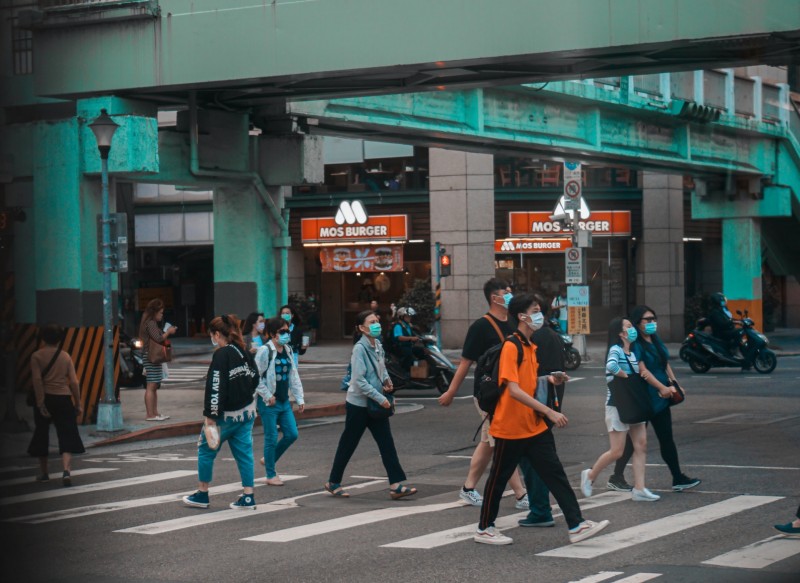
2. Who Needs to Quarantine When Coming to Taiwan?
Everyone needs to quarantine when coming to Taiwan. Eligible travelers must present a negative PCR test taken within two days of their departure. So if your flight is on the June 30, you’ll need to take the your PCR after June 28.
Also, it is suggested that you log into the Quarantine System for Entry ( https://hdhq.mohw.gov.tw/ ) when checking-in or up to 48 hours prior to departure as well as filling out a health declaration form ( Here’s an example from EVA Air ).
3. How Long is the Quarantine Period?
Starting June 15th, all visitors should apply the “3+4” quarantine rules. This means a three-day home quarantine and four-day self-initiated epidemic prevention following the end of quarantine will be required.
For the three-day quarantine, you can do it at a quarantine hotel or at home if there aren’t any other residents that didn’t travel with you. As for the four-day self-health management, there are restrictions on where you can go, including public transport and large public events. In fact, you should avoid going outside unless it’s 100% necessary. Masks must be worn and social distancing must be maintained if you go out.
For business travelers, however, going out for conducting site visits, giving a speech, or having a meeting, are allowed during the four-day self-initiated epidemic prevention period (with mask on, of course).
The quarantine starts on the day after your arrival, which means you’ll spend 4 nights at the quarantine hotels/home. For example, if you arrived on August 12th (Day 0), your quarantine days will start being counted from the 13th (Day 1). You will not be allowed to go out until August 16th. And the duration of self-initiated epidemic prevention will be from August 16th to 19th.
4. What documents/tests do you need when entering Taiwan ?
Basically, you’ll need two PCR test and (at least) one rapid test in different time periods:
- a negative COVID-19 PCR test result within two days before their scheduled flight to Taiwan.
- Upon arrival: deep-throat saliva samples will be collected from arrivals for PCR testing at the airport/port on the day of arrival (Day 0).
- During quarantine: two rapid test kits will be given to arrivals upon arrival. Use them when symptoms occur during quarantine. Also, you need the take one rapid test before going out for the first time during the self-initiated epidemic prevention period.
5. Can You Quarantine with Friends and Family?
You can quarantine with friends and family who arrived in Taiwan on the same day as you. But if you’re planning to isolate at a hotel, consider the size of your room first. It isn’t recommended for more than two people to share a single room.
6. Where Can I Stay during My Quarantine?
You must stay at a quarantine hotel or at a private residence if all of the other people there traveled with you . You can also check the availability of Taipei quarantine hotels here and find out how to book yourself a room in a quarantine hotel here:
- Quarantine hotels in Taipei City: click here .
- Quarantine hotels across Taiwan: click here .
A friendly reminder: as your quarantine starts a day after your arrival (see Question 3), you will need to book 11 nights at the hotel you choose.
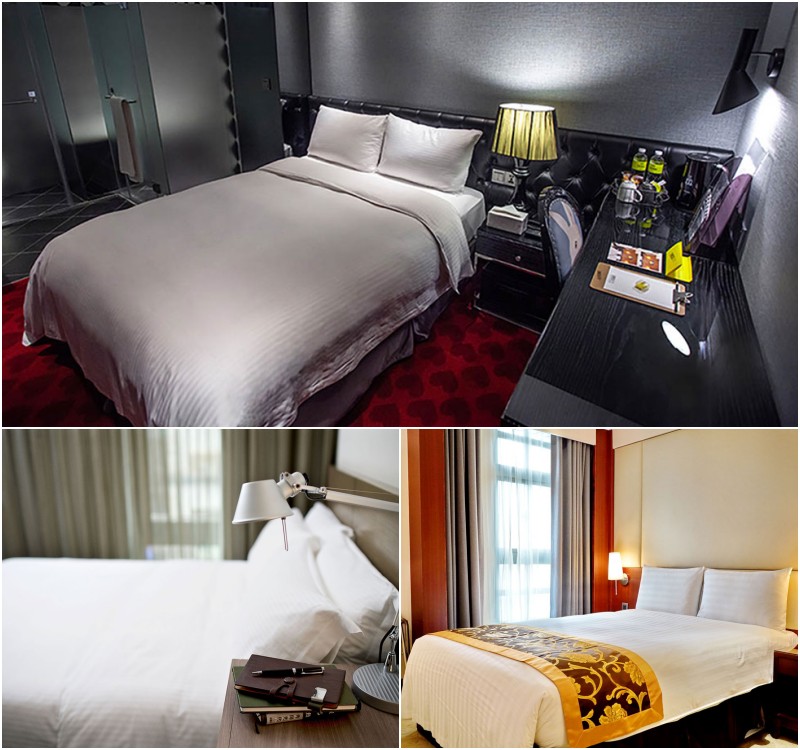
Another friendly reminder: Double check with the hotel you’d like to book by phone or email to check availability.
One more (and the last one, we promise.) reminder: There are several websites that coordinate all the quarantine hotels in Taiwan, such as AsiaYO, 14Holidays and Taipei Traveler . Their booking system is in Chinese, however…
7. Can you Rent an Apartment or Suite or Stay at a Company’s Dormitory for Your Quarantine?
Yes for dorms, as long as there is nobody else living there at the time or you have your own room and bathroom separate from others who are also quarantining. You cannot quarantine at short-term apartment rentals, including Airbnbs.
8. How Much Do I Have to Pay to Stay at a Quarantine Hotel?
The cost of your stay will depend on your hotel. Prices range from NT$1,600 to NT$16,000 per room per night! The usual price range is around NT$2,000-4,000 per room per night , though.
Most of the quarantine hotels already include the fees of daily meals in the room rate. Breakfasts, lunches and dinners will be sent to your door every day, but the down side is that you cannot choose what to eat (Taiwanese bento boxes as the photo below are common options.).
View this post on Instagram A post shared by @hubhoteluz
Some hotels will refund a little if you can take care of your own meals by using delivery apps such as Uber Eats or Food Panda . They can drop your orders at the hotel entrance and the hotel staff will bring the meals to your door.
9. How Do I Get from the Airport to Where I’m Staying?
The best advised way to get to your place of residence from the airport is by taxi . Special taxis using pandemic prevention measures are available, ensuring the driver is safe from potential infection. You can access them from the airport taxi counter. The average price for a one-way trip from Taoyuan International Airport to Taipei City is about NT$1,000 (charged by meter). If your quarantine hotel is in Kaohsiung, it will cost you around NT$2,700 by taxi from Taoyuan.
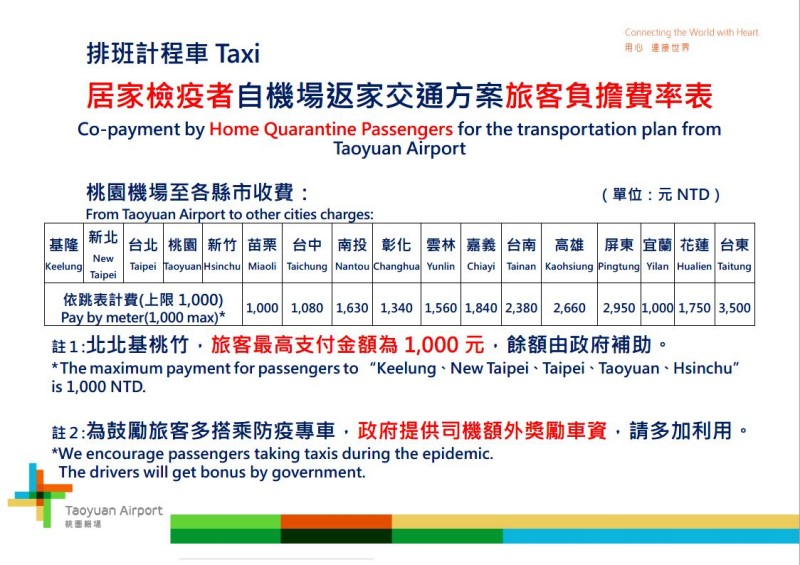
You’re not allowed to to take public transportation to your hotel. Violators will be fined between NT$100,000 to NT$1 million.
10. What is the Punishment for Breaking Quarantine in Taiwan?
You will be fined , also ranging from NT$100,000 to NT$1 million. A man was fined NT$100,000 last December for simply stepping out of his room for 8 seconds at his quarantine hotel. So, yeah, it’s probably best you stay in your room…
11. Can you Quarantine in an Apartment Building?
Yes, you can quarantine in an apartment building provided that there aren’t any other residents that didn’t arrive with you. It’s also possible to stay at the apartment of a friend or family member, but again, only if you/your travel party are the sole residents.
12. How About Previous Quarantine Experiences?
If you’re curious about quarantining in a hotel, 6 international travellers shared their experiences with us back in November. They arrived before the regulations were adjusted, so you can expect your stay to be a little shorter.
“From the landing in Taiwan to being sent to the booked hotel, all the procedures went smoothly and efficiently. I thought I may have some concerns about the 14-day quarantine life in the beginning, but it turned out just fine. During my stay in the hotel, the administrative officials in my area called twice a day to check on my physical condition; in the middle of the period, I even got a call from a Taiwan CDC volunteer to care for my mental condition. I really appreciated their help.” – Lizzie (Tokyo-Taipei)
“I was able to quarantine at home, so it wasn’t too bad. But I was very impressed by how Taiwan took it so seriously by calling and messaging me every day to make I was ok and still in quarantine. And they also they sent me a care package with snacks, instant noodles, a thermometer, hand sanitizer, and masks.” – Chris (Los Angeles-Taipei)
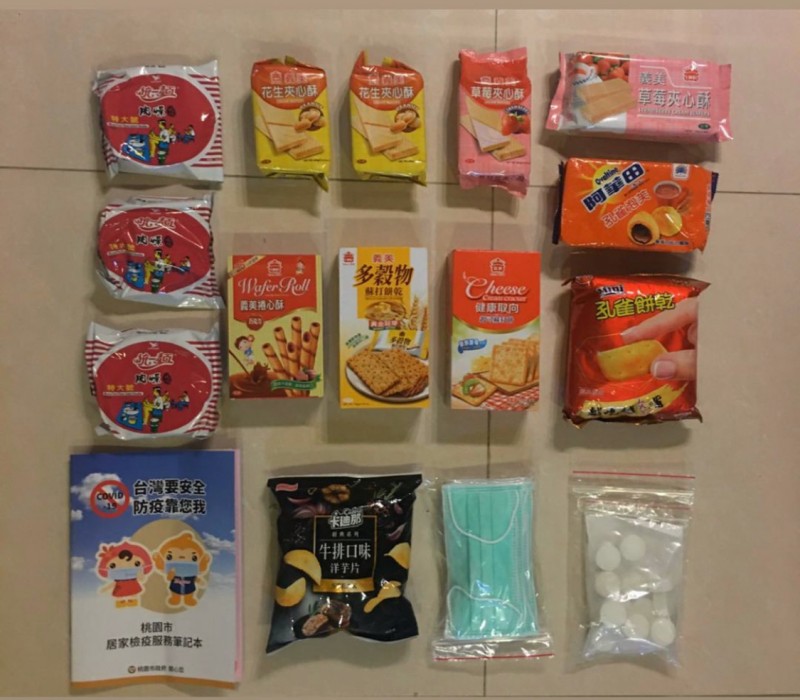
“How to kill the time was my top concern before starting my quarantine. And I found that having a SIM card with internet at the airport helps a lot, as the WIFI in my room had a super weak signal. You must have a SIM card anyway as you need to fill in your phone numbers at the entry. My room had a balcony, which was a big plus to me too. I could take a “outdoor” breath when I need it and even do the laundry there! No washing machine, though. I washed my clothes during the quarantine all by hand with a soap. – Yi Shang (Korea-Taipei)
“I started to feel a sore throat three days after starting the quarantine so I reported it to the authorities immediately. They sent an ambulance to my hotel right away, followed by a series of health checks including a lung X-ray. Luckily, my lungs were fine, no sign of infection. They still kept me at the hospital for 4~5 hours just to make sure I didn’t have a fever. I was given some medicine for curing a cold before they arranged another ambulance to send me back to the hotel.”– Jane (London -Taipei)
“Before I returned to Taiwan, my husband and I talked about what would be the best option for us to go through the whole quarantine. As he works in Taiwan and lives in our apartment, if I want to quarantine at home, he cannot stay in house either. But then we realized that there are actually regular hotels in Taiwan offering way cheaper prices to the family members of people quarantining, which a huge budget-saver for us! And eventually that’s what we did: I quarantined at our place and he booked a room at a hotel nearby. That totally made much more sense as he was allowed to go out freely, and sometimes even drop lunch at the door for me.” – Tina (Singapore-Taipei)
@NINA TAIWAN妮娜 on Youtube shares her experience of quarantine in Taiwan.
What else do you want to know about quarantine in Taiwan? Leave your questions in the comments!
New rules about quarantine click here, explore more taiwan.
- Hidden in Plain Sight: Secret Spots in Taipei’s Most Popular Places
- Your Guide to the Ultimate Scooter Road Trip around Taiwan
- A First Timer’s Guide to Kenting National Park
- The Ultimate Hiking Guide to Yangmingshan National Park
Related Topics
- coronavirus
Taiwan Scene is an online travel magazine. We publish stories introducing readers to the culture, scenery and travel possibilities of our homeland, articles to help travelers make the most of their time in Taiwan, and occasional interviews with movers and shakers from Taiwan’s ever-expanding creative scene. 一切關於有意思的台灣
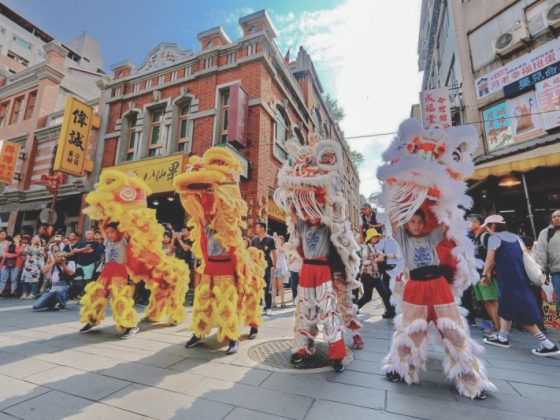
Summer Roaming with the Taipei City God
- traveltaipeimagzine
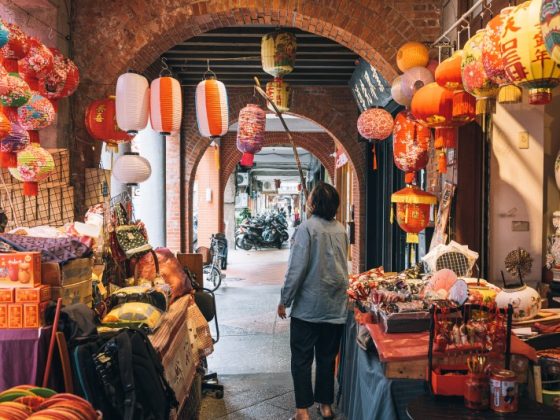
Old Taipei Shops Shine with Their Passion and Legacy: Honoring Traditions, Embracing Change
You may also like.
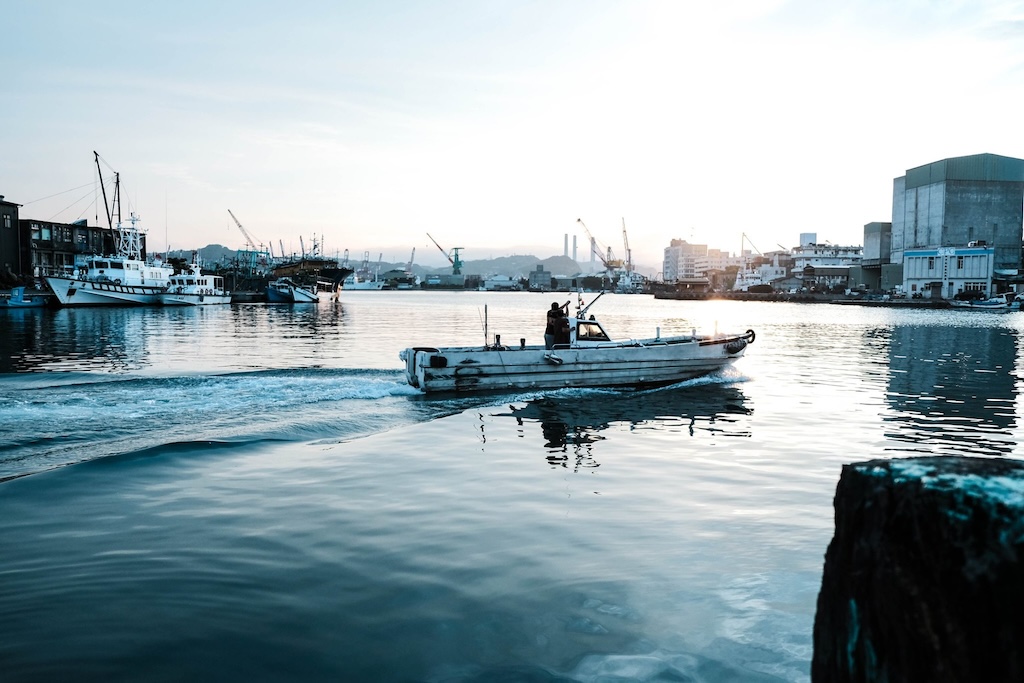
- Hotel & Accommodations
6 Good-Value Hotels in Keelung! Let’s Enjoy Breathtaking Harbor Views!
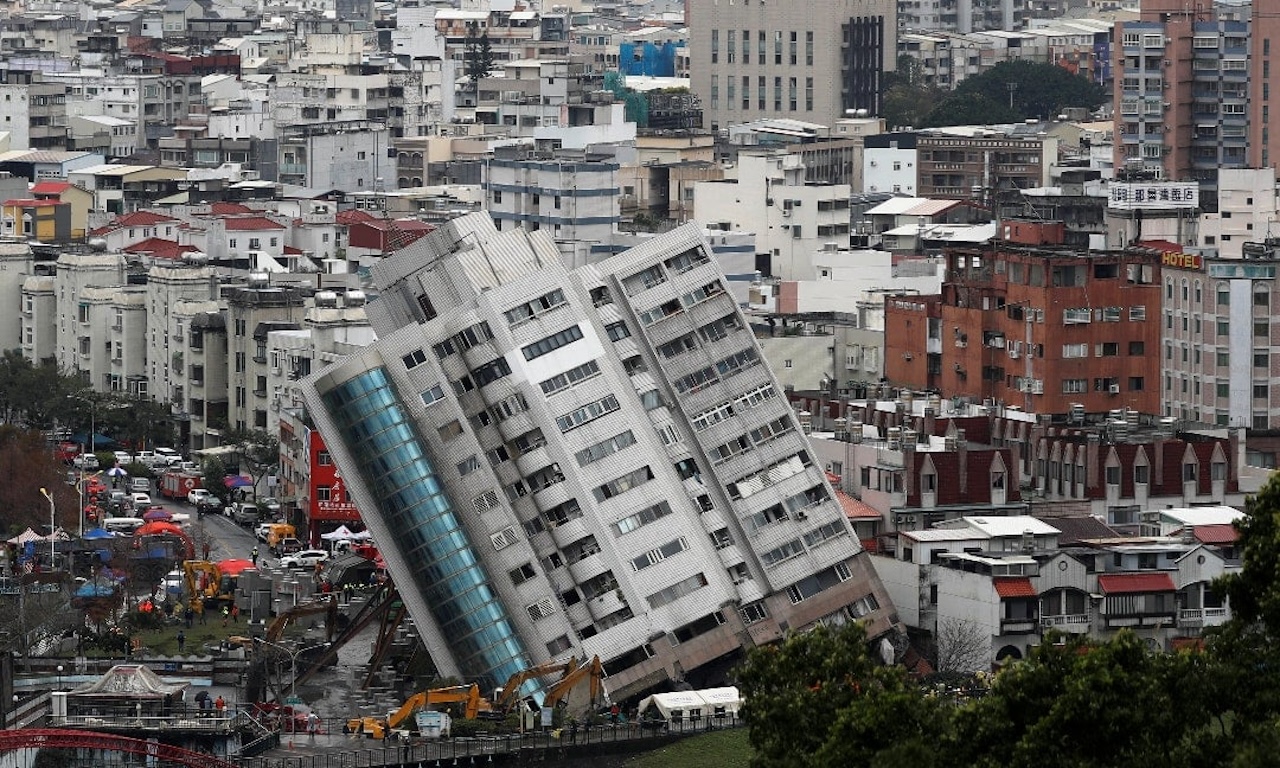
Humbled but unperturbed – how Taiwan earthquake-proofed itself
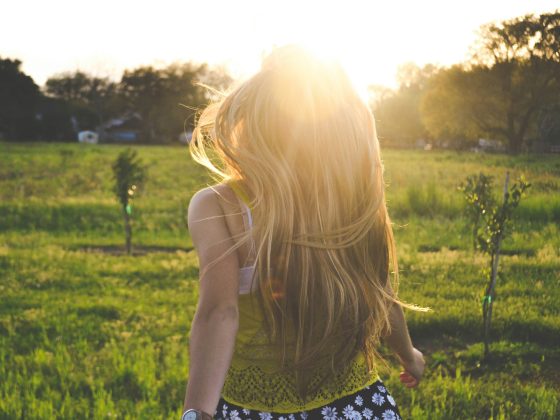
Why Taiwan Continues to Be My Chosen Home?
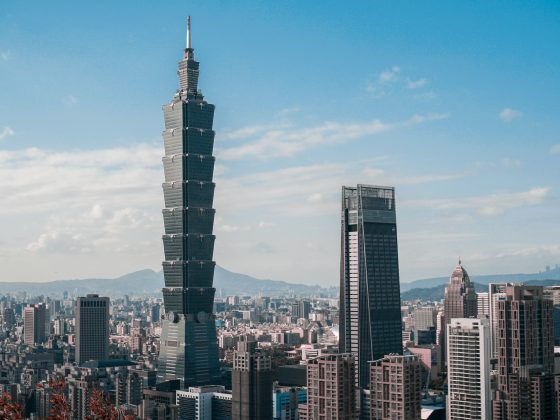
- June-Auguest
2024 TAIPEI 101 Run Up Sign-up to Start
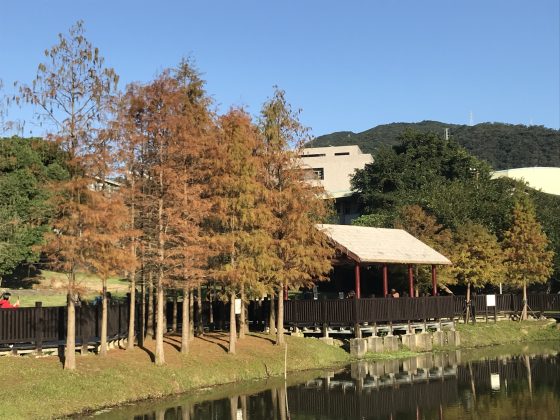
6 Must-See Secret Spots of Bald Cypress
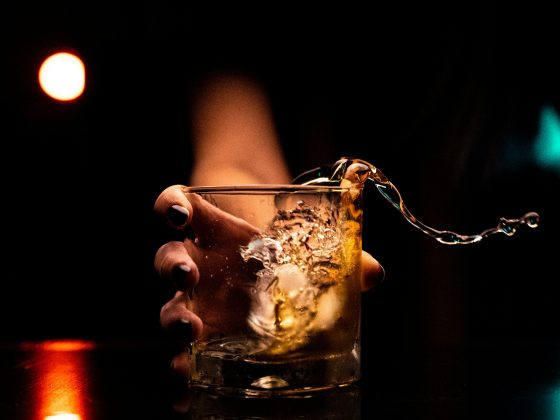
5 Taiwanese Whiskies You Must Have at Home
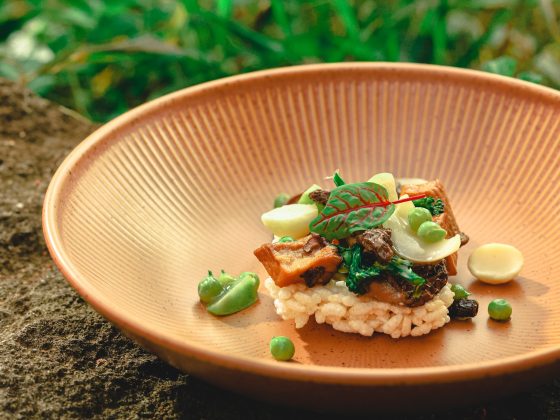
Green Living: Start with What You Eat
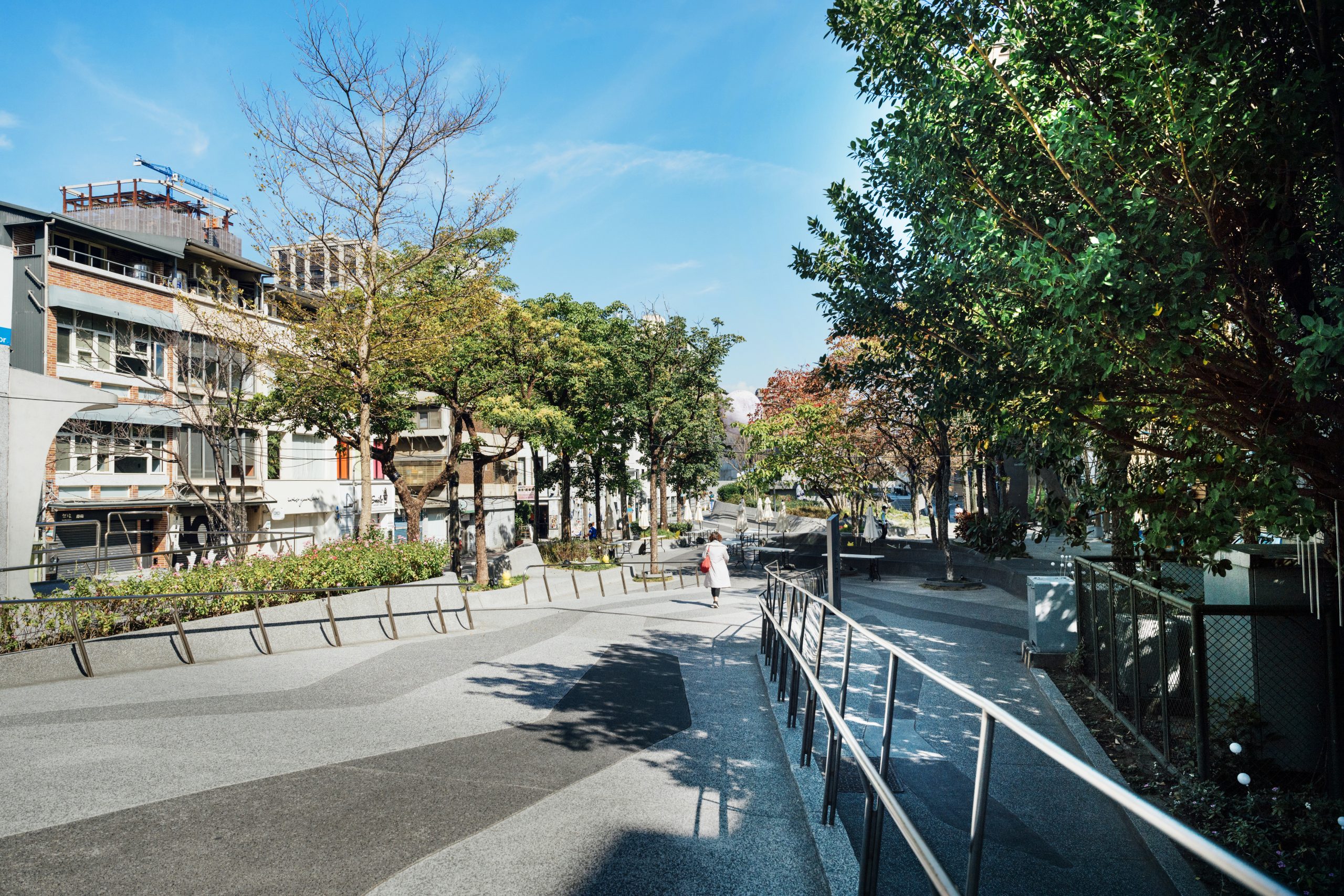
Meet You in Zhongshan: The Ins and Outs of Taipei’s Coolest Neighborhood
Comments are closed.
Input your search keywords and press Enter.

Update April 12, 2024
Information for u.s. citizens in the middle east.
- Travel Advisories |
- Contact Us |
- MyTravelGov |
Find U.S. Embassies & Consulates
Travel.state.gov, congressional liaison, special issuance agency, u.s. passports, international travel, intercountry adoption, international parental child abduction, records and authentications, popular links, travel advisories, mytravelgov, stay connected, legal resources, legal information, info for u.s. law enforcement, replace or certify documents.
Share this page:
Taiwan Travel Advisory
Travel advisory july 11, 2023, taiwan - level 1: exercise normal precautions.
Reissued after periodic review with minor edits.
Exercise normal precautions in Taiwan.
Read the Taiwan International Travel Information page for additional information on travel to Taiwan.
If you decide to travel to Taiwan:
- Follow the U.S. Department of State on Facebook and Twitter .
- Enroll in the Smart Traveler Enrollment Program (STEP) to receive Alerts and make it easier to locate you in an emergency.
- Review the security report for Taiwan from the Overseas Security Advisory Council.
- Prepare a contingency plan for emergency situations. Review the Traveler’s Checklist .
- Visit the U.S. Centers for Disease Control and Prevention (CDC) page for the latest Travel Health Information related to your travel.
Travel Advisory Levels
Assistance for u.s. citizens, search for travel advisories, external link.
You are about to leave travel.state.gov for an external website that is not maintained by the U.S. Department of State.
Links to external websites are provided as a convenience and should not be construed as an endorsement by the U.S. Department of State of the views or products contained therein. If you wish to remain on travel.state.gov, click the "cancel" message.
You are about to visit:
Cookies on GOV.UK
We use some essential cookies to make this website work.
We’d like to set additional cookies to understand how you use GOV.UK, remember your settings and improve government services.
We also use cookies set by other sites to help us deliver content from their services.
You have accepted additional cookies. You can change your cookie settings at any time.
You have rejected additional cookies. You can change your cookie settings at any time.
- Passports, travel and living abroad
- Travel abroad
- Foreign travel advice
Entry requirements
This advice reflects the UK government’s understanding of current rules for people travelling on a full ‘British citizen’ passport , for the most common types of travel.
The authorities in Taiwan set and enforce entry rules. If you’re not sure how these requirements apply to you, contact the Taipei Representative Office in London or the Taipei Representative Office in Edinburgh . Entry procedures are being regularly reviewed, so may change at short notice.
COVID-19 rules
There are no COVID-19 testing or vaccination requirements for travellers entering Taiwan.
Epidemic prevention period
When you arrive in Taiwan, the authorities advise that you observe a 7-day self-initiated epidemic prevention period, but you no longer need a negative test result before going out. The authorities are no longer providing free rapid test kits on arrival. You can use your booked accommodation and you can move freely during the 7 days.
This self-health management scheme is provided as guidance by the Central Epidemic Command Center (CECC), and members of the public are free to decide whether to follow it. Please consult the Centres for Disease Control website for the latest guidance.
Passport validity requirements
To enter Taiwan, your passport must have an ‘expiry date’ at least 6 months after the day you arrive.
Check with your travel provider that your passport and other travel documents meet requirements. Renew your passport if you need to.
You will be denied entry if you do not have a valid travel document or try to use a passport that has been reported lost or stolen.
Visa requirements
You can spend up to 90 days in Taiwan without a visa. You can extend this by a further 90 days once you have arrived in Taiwan. You can get more information on entering Taiwan without a visa (‘visa-exempt entry’) from the Taiwan Bureau of Consular Affairs. This applies if you travel:
- as a tourist
- to visit family or friends
- to attend business meetings, cultural or sports events
If you plan to stay in Taiwan for longer than 180 days, you must have a visa before you arrive. If you stay beyond the time given on your visa, you will get a fine and risk being deported from Taiwan.
There are specific rules for naturalised British citizens born in the People’s Republic of China and holders of British National (Overseas) passports wishing to enter under the visa waiver scheme.
You should contact the Taiwan Bureau of Consular Affairs or Taiwan National Immigration Agency for further information.
Applying for a visa
If you are in the UK and need a visa, apply at your nearest Taipei Representative Office . If you are in Taiwan, apply through the Taiwan National Immigration Agency .
Alien Resident Certificate and Alien Permanent Resident Certificate holders
If you already hold a resident certificate, you do not need a visa to enter Taiwan.
If you hold a Youth Mobility Scheme visa for Taiwan , you can apply to switch to a working visa or a visa to study a degree course at undergraduate level or higher.
Submit your application to the Bureau of Consular Affairs for consideration. You can then apply for an Alien Resident Certificate (ARC) at your local National Immigration Agency (NIA) Service Center once your application has been approved. Contact the Bureau of Consular Affairs or National Immigration Agency for further information.
Vaccination requirements
At least 8 weeks before your trip, check the vaccinations and certificates you need in TravelHealthPro’s Taiwan guide .
Customs rules
There are strict rules about goods you can take into or out of Taiwan . You must declare anything that may be prohibited or subject to tax or duty. Contact the Customs Administration for further information.
Animal products
Do not bring animal products into Taiwan without authorisation. If you are caught with any animal products, you may face a heavy fine. Customs officials have increased inspections due to concerns about African Swine Fever Virus in pork products, particularly from the People’s Republic of China.
Bringing money into Taiwan
Declare cash or travellers cheques if the value is higher than 100,000 New Taiwan Dollar (NTD) or 10,000 US dollars. You will get a certified declaration to show you brought it in with you. If you do not, your money could be seized when you leave. Contact the Customs Administration for further information.
International bank transfers can be slow. Most of the ATMs in 7-11 stores accept international cards. Other ATMs may accept them, but not all do.
American Express, Citibank and Thomas Cook branches accept their own-brand travellers cheques. You may need your receipt as well as your passport when you cash them.
Related content
Is this page useful.
- Yes this page is useful
- No this page is not useful
Help us improve GOV.UK
Don’t include personal or financial information like your National Insurance number or credit card details.
To help us improve GOV.UK, we’d like to know more about your visit today. We’ll send you a link to a feedback form. It will take only 2 minutes to fill in. Don’t worry we won’t send you spam or share your email address with anyone.

A Guide to Taiwan’s Quarantine Hotels and COVID Travel Restrictions
Dear reader: This article contains links to products and services that I may be compensated for, at no extra cost to you.
Quick Summary – As of October 13, 2022, Taiwan is totally open to all international tourists. Some can enter visa-free, while others need to apply for a visa ( see the full list here ). – There is no longer any testing, tracing, quarantine, health forms, special rules, or vaccine (this was never required) to enter Taiwan. – As of March 20, 2023, virtually all COVID restrictions are finished. You can stay in any hotel or accommodation, including hostels dorms, and travel around as normal. Masks must be worn on public transportation, in taxis, and in medical facilities. Most locals are still wearing them everywhere in public. – I am no longer updating the below article, but keeping it live in case anyone wants to remember what a shit-show that was.
After Taiwan’s borders closed to all tourists on March 19, 2020, they remained that way for over two years. As of September 12, 2022, Taiwan has finally re-opened to tourists from certain countries, but those visitors must still undergo the 3+4 days of quarantine process. I will be covering exactly what all this entails in great detail below. The list of countries will be expanded on Sept. 29, and then the country is set to totally open, with no quarantine or PCR testing, on October 13, 2022.
Entry restrictions to Taiwan due to the COVID-19 pandemic have effectively destroyed my travel business. Because of this, and the fact that the arrival rules are so complicated and always changing, I’ve avoided writing about them here, on my mostly Taiwan-focused website until now. In fact, I’ve barely mentioned the dreaded words “COVID” or “quarantine” in my articles. And like you, I just look forward to the day when we can put all of this behind us.
I’ve personally cancelled my family’s flights back to Taiwan from where we now live in Canada twice since early 2020, not because we couldn’t get in (we are citizens/permanent residents), but because of all the testing/quarantining costs on both ends.
In May to July of 2022, we finally went back for the first time since 2019. All the below info about entry requirements, how to quarantine in Taiwan, COVID rules, and so on come from my personal experience doing the arrival and quarantine process in Taiwan, as well as government websites and the experiences of people reported online as well as people I personally know.
For the latest updates as soon as they roll in, please join my Taiwan Travel Planning group , and for quarantine-specific questions, I also recommend the group Quarantine Support in Taiwan . You can also call 1922 (then #7 for English) in Taiwan for any COVID or quarantine related questions.
For more information about planning your trip, see my Taiwan Travel Guide , favorite things to do in Taiwan , and recommended Taiwan travel itinerary .
Table of Contents
Current Border Restrictions
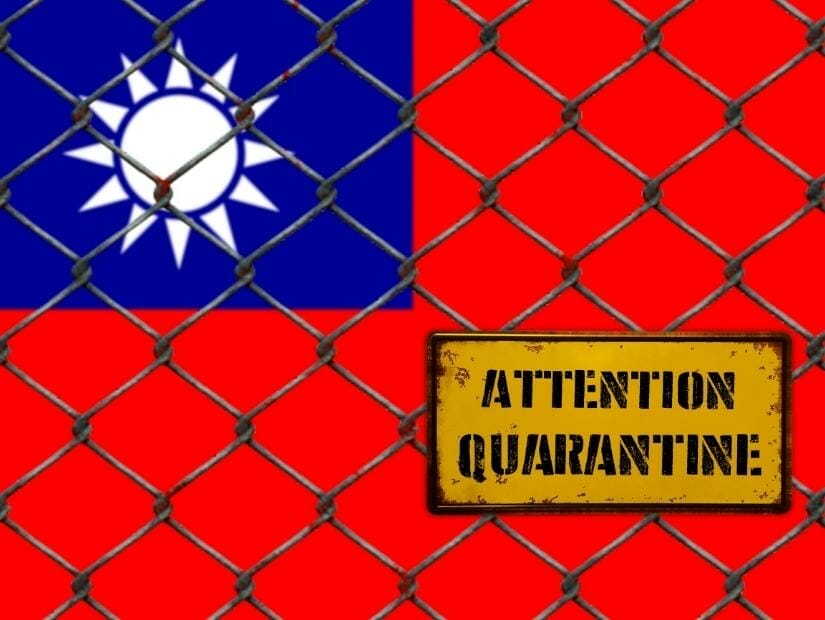
When Taiwan first closed its borders, it came in steps. Before the full tourist ban was implemented, the countries of the world were categorized into levels based on how bad their outbreaks were, there were different restrictions for each level, and they changed almost daily. Suffice to say it was very messy.
Now that Taiwan is beginning to reopen, they are also doing it gradually in steps, with the most notable steps so far coming on September 12, 2022, when they began letting visitors from certain countries enter for tourism purposes again (see the list of countries below), Sept 29, when the list of countries was expanded to include several neighborhing (Asian) countries, and Oct. 13, when all restrictions will be dropped.
As this process unfolds, I will continue to update this article daily with the latest Taiwan entry restrictions by country.
Are Taiwan’s Borders Open to Tourists Right Now?
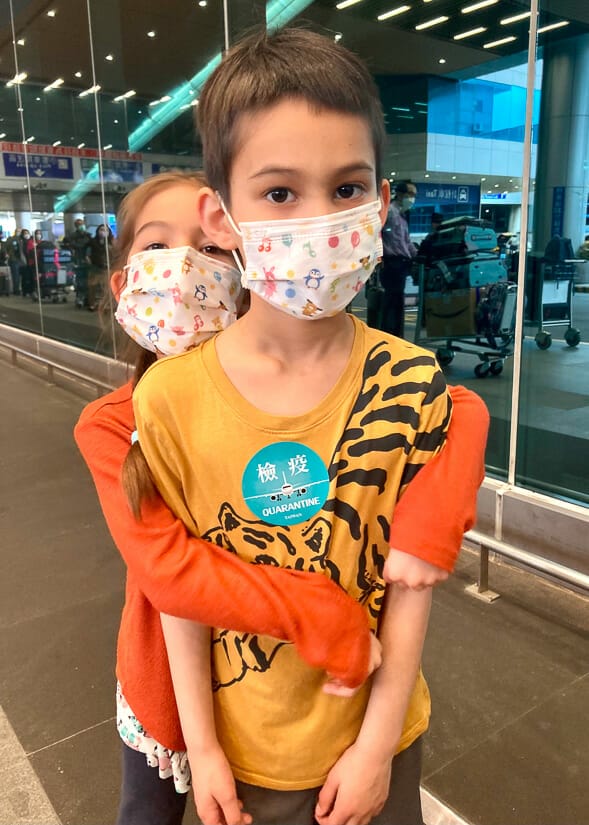
For most of the pandemic, the answer has been no, but as of September 12, 2022, the answer is YES, for visitors from certain countries, and then even more countries after September 29.
The Taiwanese government and Central Epidemic Command Center (CECC), under the Taiwan Center for Disease Control (CDC) have impressively crushed two major waves of COVID since the pandemic began. Until mid-2022, there was an admirably low number of COVID deaths in Taiwan, less than a thousand, which is less than a quarter of my home province in Canada, but with five times my province’s population. Once Omicron finally got in, the numbers skyrocketed, but thanks to vaccinations, universal mask wearing, and impressive contract tracing, the number of deaths remained comparatively low.
Numerous press announcements over the last two years have hinted at possible loosening of border restrictions when future vaccination benchmarks were reached (for example 80% double vaccination, 50% booster, and now they are saying 50% vaccination rate among young children). But when those first two benchmarks were reached, it was right around the time that Omicron took off, so they decided to keep the borders closed after all to prevent a Hong Kong-like situation from occurring.
As of March 7, 2022, Taiwan loosened the mandatory quarantine for all arrivals (for those who can get in, that is) from 14 days to 10 days (technically 11 nights, as the arrival and check out dates aren’t counted). Moreover, it allowed them to do their quarantine at home instead of a quarantine hotel, so long as their home meets certain requirements. They also made it even easier for business travelers to enter from this day on. The next step was a further reduction to 7 days of quarantine, which started at 12 a.m. on May 9, 2022, and then a reduction to 3+4 days on June 15.
This means 3 days of quarantine + 4 days of “self initiated epidemic prevention”. In practice, the day of arrival doesn’t count, so it’s actually 4 + 4. In other words, this is 4 days of strict quarantine, plus 4 days when you are allowed to go out for certain things.
On July 25, they started letting 6 categories of people to apply for permission to enter. These are volunteers, missionaries, religious scholars, interns, and people on international exchanges and working holidays. These people are still subject to 3 + 4 days of quarantine. Some have speculated that the next step will be a reduction to “0 + 7 days” (zero days of quarantine but seven days of self monitoring), but this isnt’ certain.
Then on September 12, Taiwan finally announced that tourists from certain countries were allowed. It was surprising that they mainly welcomed tourists from Western countries first. Before COVID, tourists from Asian countries far outnumbered those from Western ones. My guess is that this is part of their “gradual approach”. I don’t think a large number of tourists from faraway Western countries are suddenly going to start planning big trips and showing up in Taiwan right on September 12, especially when they still have to undergo quarantine upon arrival. But then, thankfully, Taiwan added most of its Asian neighborhing countries to the list from September 29.
From the very beginning, Taiwan has considered tourists the last priority. The country is not heavily dependent on tourist dollars like so many other countries. In fact, their economy has been booming through COVID, and there are enough local travelers to support local hotels and attractions. Having said that, several businesses who depended largely on foreign guests have, unfortunately, gone out of business. Examples include Modern Toilet Ximen , the Starbucks in Taipei 101 , and several tours, guides, and agencies that catered to visitors.
You can see the latest CDC updates with the most current changes and assessments of the situation. Updates come daily.
Who Can Enter Taiwan Right Now?

As of September 12, 2022, nationals of the following countries are allowed to enter Taiwan for tourism purposes and don’t need to apply for a visa: USA, Canada, the EU, Australia, New Zealand, and Taiwan’s 14 diplomatic allies (Belize, eSwatini, Guatemala, Haiti, the Holy See, Honduras, the Marshall Islands, Nauru, Palau, Paraguay, Saint Kitts and Nevis, Saint Lucia, Saint Vincent and the Grenadines, and Tuvalu) . They still have to undergo testing and quarantine on arrival, which I will cover below.
As of September 29, 2022 the following nationals were added to the list of people who can enter Taiwan: Japan, South Korea, Malaysia, Singapore, Philippines, Thailand, Brunei, Dominican Republic, Israel, Chile, Nicaragua .
All of the countries above can enter Taiwan without a visa, as before COVID. For the amount of time nationals of each of these countries can enter, see this page https://www.boca.gov.tw/cp-149-4486-7785a-2.html (you need to copy and paste this link to your browser. For some reason, it always redirects if you just click it).
For nations all other countries not mentioned above, a visa is required, and they will be able to start about for this visa from October 13, when the borders are totally opened. Russia is one exception; so far they have not yet announced whether nationals of Russia will be allowed in and when.
The following people have been allowed to enter Taiwan throughout COVID, and still are today. They also have to undergo testing and quarantine upon arrival:
- Taiwanese citizens (holding a Taiwanese passport)
- Foreign residents of Taiwan (holding an ARC or APRC)
- Foreign relatives of Taiwan citizens/ARC holders (i.e. children and spouses of citizens or residents)
The below can also currently enter but must apply for and receive approval first (starting from various points during the pandemic):
- Business/investment/contract visitors
- International students coming to study in formal degree programs in Taiwan
- Persons coming to Taiwan for employment
- Persons coming for emergency or humanitarian reasons
- Volunteers, missionaries, religious scholars, interns, and people on international exchanges and working holidays
Are Transit Passengers Allowed at Taiwan’s Taoyuan International Airport
For most of the pandemic, transit passengers have NOT been allowed at Taiwan’s Taoyuan International Airport . This finally changed on June 15, 2022. So now, YES, transiting at Taiwan’s main airport is allowed again, though it will take a while for airlines to actually start routing more flights through Taiwan again.
Taiwan’s Current Quarantine Protocol
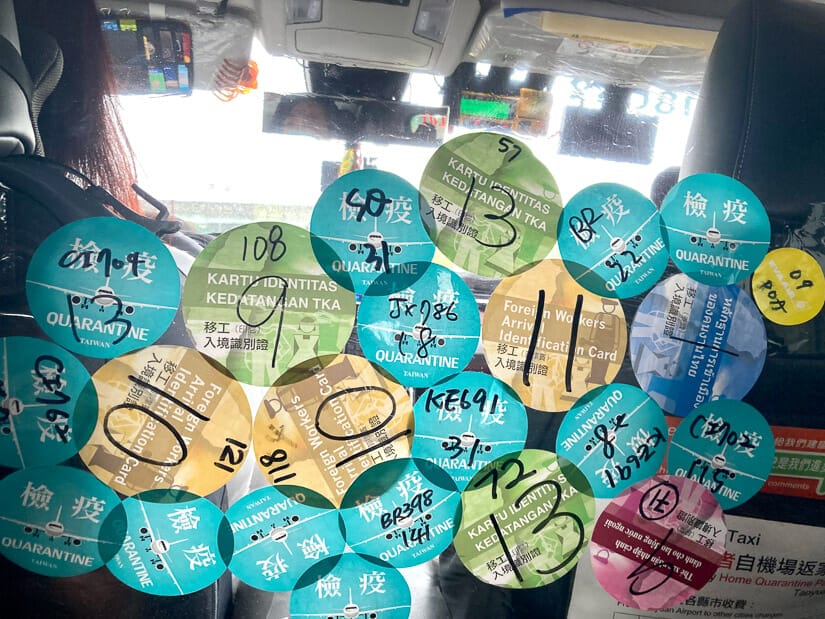
Everyone who is able to enter Taiwan has to undergo testing before and upon arrival and a mandatory 3 days of self-paid quarantine + 4 days of self monitoring (technically it totals to 8 nights, because your first night and check out day don’t count), as of June 15, 2022. The only people who have been able to get reduced quarantine have been pilots/airline workers and some high level business or political visitors.
If you arrive in Taiwan after October 13, 2022, you will not have to do any quarantine. Instead, you will only have to watch your health for 7 days (called the 0 + 7 system) and take a few self-administered rapid tests. They will you 4 such test kits upon arrival at the airport, free of charge. the first two are meant to be taken on days 1 and 2, while the other 2 are for if you develop symptoms later.
Before Coming to Taiwan
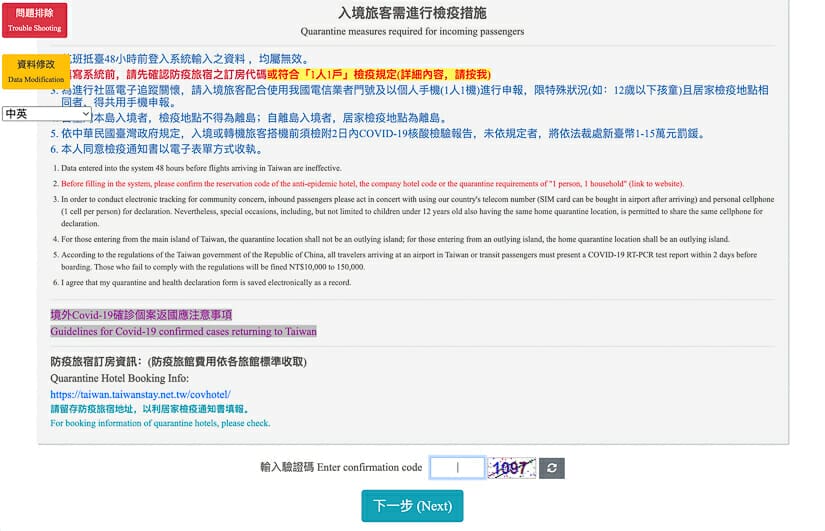
- Book a quarantine hotel or arrange a residence to quarantine in (more info on both below). You need to book it for 8 nights under the “3 + 4” system, since your arrival day and first night count as “day zero”.
- As of August 15, 2022, NOBODY needs to take a pre-flight PCR test before coming to Taiwan anymore (but you still have to be one of the select groups of people who are allowed to enter Taiwan). So you can ignore the next three paragraphs, but I’ll keep them up (with strikethrough) in case anyone needs that information.
- Get an RT- PCR test 1 or 2 days before your scheduled flight (July 14 update: Citizens, ARC-holders, and transit passengers no longer need to get a pre-flight PCR test). For any other travelers who are not citizens, ARC holders, or transit passengers, you still need to get a PCR test 1-2 days before your flight departure. For example, if your flight to Taiwan departs on June 9 (even for example, 1 AM of June 9), you should get the test on June 7 or 8. If you have a connecting flight to Taiwan, you count back from the date of the first leg of the flight, unless your stopover is more than 2 days. Make sure that you get it early enough so that you will receive the results before your flight, but not too early. Find out in advance how long the results will take. Important point: the test results paper must indicate your name (matching passport name) passport, date of birth or passport number, specimen collection date, testing method, report date, and test result. The “specimen collection date (or date the test was administered) is essential, so make sure the facility includes it. The test result has to be negative. A digital copy of the report is fine.
- If your PCR test is positive, you’ll have to reschedule your flight, cancel your quarantine hotel (if you have one booked, and they mostly allow this), and retest again TWICE starting in 10 days (first re-test after 10 days, second one another 24 hours after first one). If both retests are negative, then you can fly to Taiwan. This is technically the rule, but some people have reported that even though they retested twice, nobody in Taiwan asked for proof of their two tests when they later arrived. I’m not saying you should only test once; but that’s just what people have reported.
- Children aged 6 or under, those with medical exemption, or people in country that doesn’t offer PCR test don’t need to take the pre-flight PCR test . However, you have to print and fill out this PCR test exemption form and present it to your airline for check in and upon arrival. In our experience, the airline then placed us at the back of the plane, and my 6-year-old daughter (who didn’t get the test) had to use a separate toilet on the plane. Upon arrival in Taiwan, we had to exit the plane last, then we had to be met by a staff member on arrival, who took us to a separate line to register her, before we could go through the usual lines. It made our arrival process almost 30 min longer. Note: if you have another reason for not being able to take the PCR test, you’ll need to have sufficient proof.
- Fill in and submit the Quarantine System For Entry Form online 48 hours or less before arriving in Taiwan . If you do it more than 48 hours before your arrival time (in Taiwan time), it will be considered invalid. I recommend doing this at home before your flight, not at the airport like many people do. For us, our total flying time from Canada to Taiwan (including all checking in, waiting, transfers) was 22 hours, which gave us a full day before leaving to do this. Many people don’t do it until they get to the airport, then find the form is confusing or takes a long time to fill out, causing a lot of stress right before their check in. Do it at home!
- To fill in this form, you’ll need some personal info, flight number, quarantine hotel information (including hotel ID and address) or address of home quarantine. One child age 12 or under can be added per one adult form–there will be a spot to “add a person under 12” on the final page before you submit; you’ll need to fill in the whole page with all your person info first. For departure country, enter your original departure country (unless you have a stopover more than two days on the way). For the flight number, enter the details of the one that lands in Taiwan. If you don’t have a Taiwan phone number yet, enter your home number. You’ll be able to get a SIM card when you arrive in Taiwan and update the form, with help from the airport agents. Make sure the cell phone you come with is unlocked!
- When you click on the submit form, the form will be sent to the authorities in Taiwan. There won’t be any popup or words telling you that the submission was successful, but don’t worry, it works. Then it will go to a page showing your final report, called “Quarantine System for Entry – Departure Place Declaration Certificate”. This is what you need. Screenshot it. The airline will ask to see this before you get on the flight to Taiwan. At the bottom of the page, there is a confusing little button that says “Save – Press it for 2 seconds”. Many people mistakenly think this is the final submission button. It’s not. Your form has already been submitted. This button, if held for 2 seconds (on mobile only) will save a copy of the form in your phone’s camera roll.
- If you have entered a non-Taiwanese phone number like we did, you’ll probably receive a text message from the Taiwan CDC before you board your flight. You don’t need to click the link contained in the message, but save the text message. It’s just a confirmation message, and may be needed later when you arrive in Taiwan.
- Make sure your phone is charged when you arrive in Taiwan. I suggest bringing a battery pack.
- There may be additional forms required by your airline. We received an email from EVA airlines with a checklist of all the forms we needed. Also note, your country may require proof of vaccination for domestic flights or checking in at your airport, but Taiwan technically doesn’t (yet) require proof of vaccination to enter.
What Happens When You Arrive in Taiwan
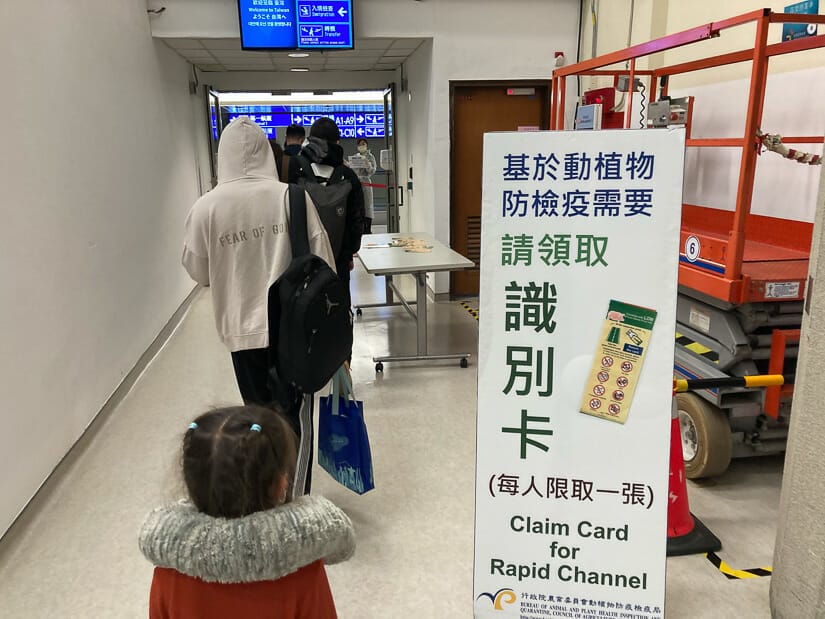
- Get off the plane and follow the signs to exit. If you are traveling with a person who didn’t get the pre-flight PCR test (like us with our 6-year-old daughter), you may have to leave the plane last. When we got off the plane, there was a lady waiting with a sign with our daughter’s name on it. We then had to wait for all the other people with young kids who didn’t get tested. The woman then took us through the entire processing area, where there were hundreds of people waiting in lines, to a line where we had to register our daughter, give them the PCR test exemption form, and then go back to join the long lines.
- Follow the signs/flow of people until you reach the processing area. It’s impossible to get lost or go the wrong way – there’s only one way to go.
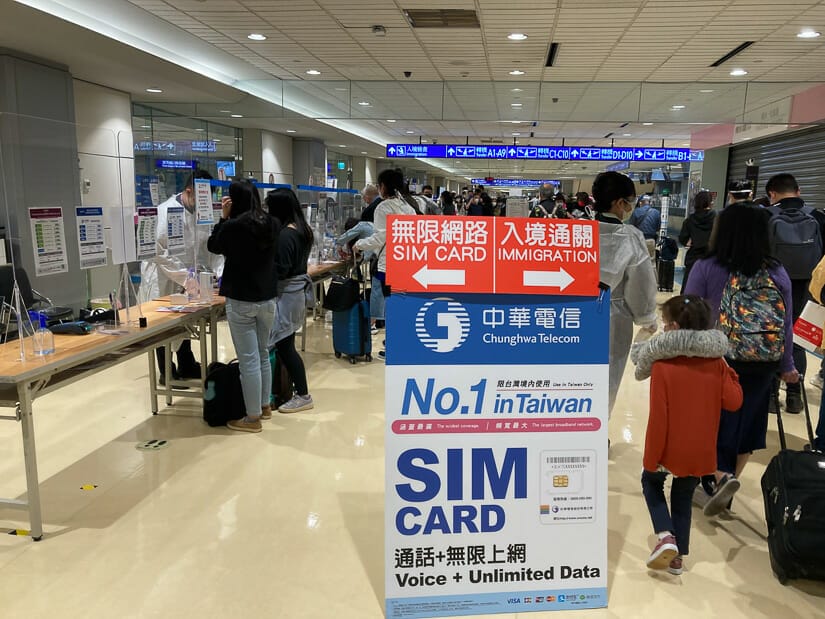
- If you don’t have a SIM card yet, join the line to buy one FIRST (line on the left in the above picture). Do not get in any other lines, such as the immigration LINE. When we arrived, the line was quite long (we waited about 20 minutes). It’s clearly marked, and there are lots of staff to guide people. But still, don’t go into sheep mode and just get in whatever line it seems everyone else is getting in (several people have reported doing this, and then having to go back to the end of the SIM card line. Important note: make sure your cell phone is UNLOCKED before coming to Taiwan.
- The SIM card counter has multiple phone options, and the staff will help to switch your card. They accept cash or international credit cards. You’ll see that most options come with unlimited data, plus some extra amount for voice calls. The first two (Chunghwa) are the most recommended and reliable, especially if you need strong WiFi for video conferences or anything like that.
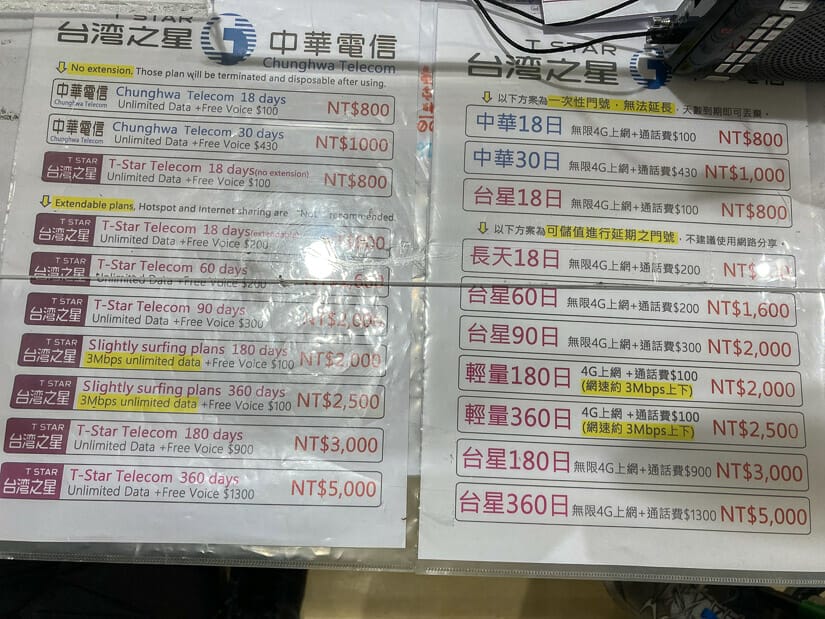
- After you get your SIM card, ask a staff member to help you input it into your “Health Declaration Certificate” report. We watched as a staff member did ours: first, he went to the text message that we had received before boarding our flight in Canada. He clicked the link. It took him to a page where it asked to enter the last 5 digits of our passport number. Then it went to a page where he input our new phone numbers. (I don’t want to say this is all he did, because he was doing it very quickly and I may not have caught everything). After he did that, we received a new text message with a link. When we clicked that link, it went to our new, updated “Quarantine Declaration Certificate”, which contains a bar code. Screenshot the form, as you will need to show it several times after this. If you have added a child 12 or under on your form, this process will need to be done once for yourself, and again for your child, and there will be one final report for each of you. Screenshot both of them.
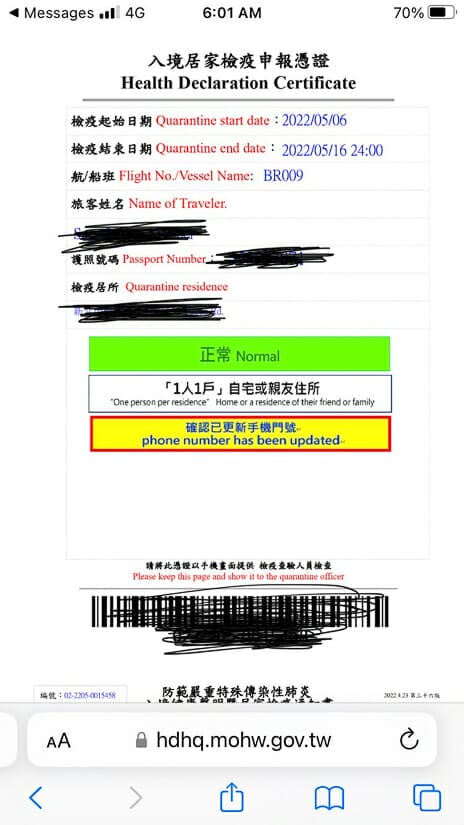
- Now you get to join the other line, which is opposite the SIM card station/line. When we first arrived, this line was very long, but because we were at the end, by the time we finally got in this line, it was quite short.
- If you already had a Taiwan phone number before arrival, you don’t need to join the SIM card line. Just go directly to the immigration line. You should receive a text message with a link to your “Quarantine Declaration Certificate” within a few minutes of arrival. If you don’t, ask an agent.
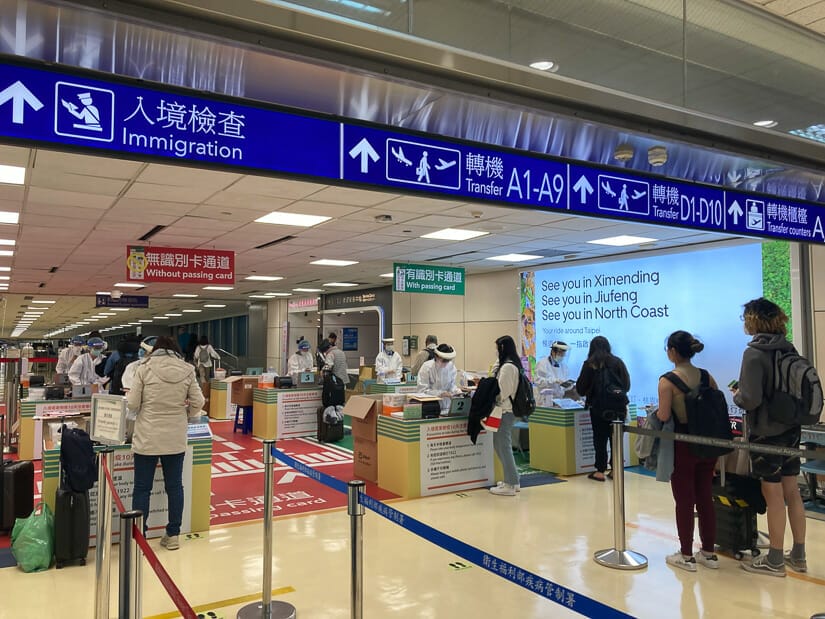
- When you get to the front, you’ll need to show your passport, provide your phone number (if you just bought a SIM card, they’ll give you a paper that shows your new number), and show your Health Declaration Certificate to register for your arrival COVID saliva test. NOTE: as of June 15, EVERYONE does the saliva test, no matter your country of original. Before, people from all (and then later only certain) countries still had to do the more intrusive and painful nose test). Also note: unlike with the nose tests, you no longer have to wait at the airport for the results. You will be contacted later while in quarantine if you test positive. Also note, as of September 29, saliva PCR tests will no longer be conducted upon arrival in Taiwan.
- If your child is under 2, it would be too tough to collect the amount of spit they require (5 ml), so he or she will need to take an Orophraryngeal swab. They will give you a paper indicating the kind of test you will need to take. Our kids (aged 6 and 8), were able to spit enough, but it took them a while.
- At this same station, they will also give you two antigen rapid test boxes per person. One is to be used on the final day of your quarantine to allow you to exit quarantine, and an extra one is provided for use in case you start showing symptoms of COVID. (Note: when quarantine ends on October 13 and the 0 + 7 days system starts, you will receive 4 kids. One is meant to be used on day 1, another on day 2, and the other two for later if you develop symptoms.
- After receiving your spit cup and rapid antigen test kits, you’ll proceed through immigration, where you’ll have to show your “Health Declaration Certificate” form to the agent.
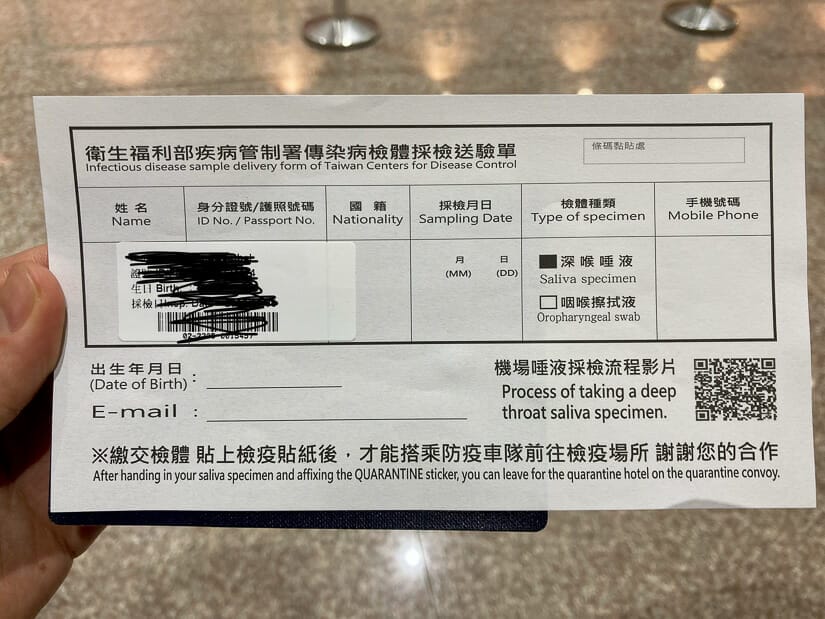
- Next, you’ll proceed to the baggage area to collect your baggage.
- Next, you’ll proceed into the arrival area (where in the past the public could wait for and greet arriving passengers). You’ll join a long queue for the spit test. The line makes its way outside, where you’ll leave your luggage cart, the proceed around the corner of the building to the outdoor testing area. You’ll show your passport and the little paper they gave you with the type of test checked. Then you get to stand at a booth and spit into the little cup you were provided with earlier until it reached the little line at 5 ml. It’s a lot of spit, so it might take you a while. I would suggest starting to collect spit in your mouth from the moment you step outside of the airport. Then, you close the lid, but it in a little ziplock bag provided, and give it to the staff, along with the little paper. If your baby has to do the throat swab, they’ll also do it here. After you complete this step, they’ll put a quarantine sticker on your shirt (you can see people’s quarantine stickers on one of my pictures above, posted on the separation wall inside a taxi).
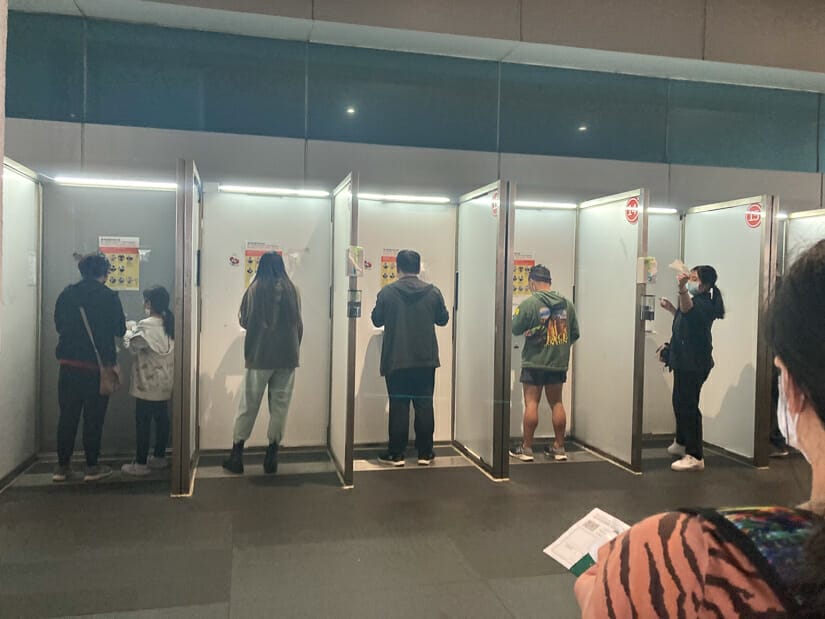
- Go back to collect your luggage cart and proceed to the taxi area (if you plan to take a taxi), which is right in front of the main arrival hall doors. There are staff directing people where to go. The main (by far longest) line is for all destinations in Northern Taiwan, including Taipei. For destinations in Central or South Taiwan, they will direct you to the appropriate line.
- If you’re getting picked up by a friend or family member, that is now allowed, but you can’t go stay with them. They can just drive you to your hotel or quarantine location which meets all the necessary standards (see below section). You still can’t take the airport MRT or other forms of public transportation to reach your quarantine location. As of September 1, 2022, you are allowed to drive yourself to your place of quarantine, for example in a rented car or car someone has left at the airport for you. As of September 29, you are also allowed to get a ride from somebody to your quarantine location. As of October 13, you will be allowed to take public transportation from the airport (buses or Airport MRT).
- If you need to withdraw money from an ATM for paying for your taxi, or to have some cash for ordering food during your quarantine, or for getting home after your quarantine, go back into the airport arrival hall and do it before getting in the taxi line. I strongly recommend having at least a couple thousands NTD just in case. There are also currency exchange booths in the airport (before collecting luggage). Note that when we last arrived, there were no duty free shops or convenience stores that we were able to visit upon arrival at the airport.
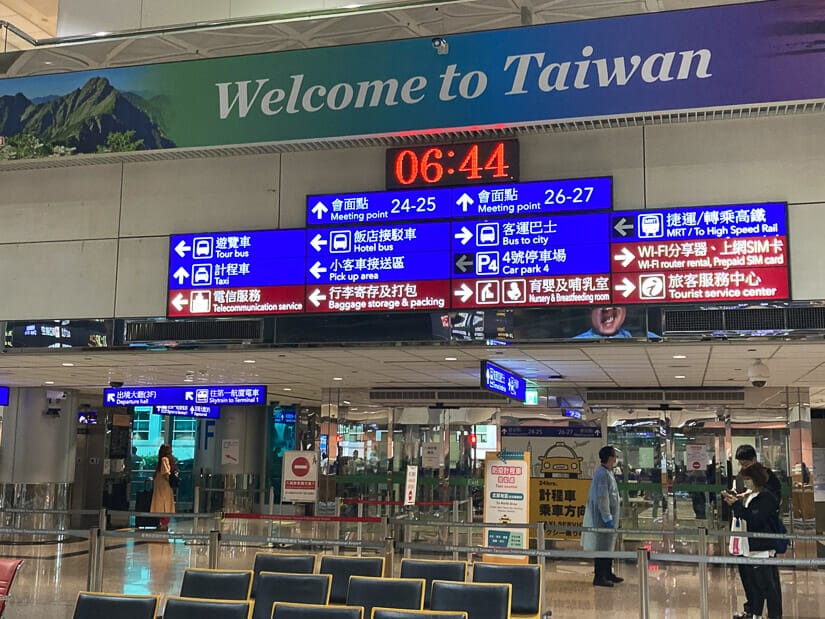
- While in line for the taxi, they will spray you and your luggage down with sanitization liquid. You may also (once again) have to show your Health Declaration Certificate. The taxi line can be really long (we waited almost an hour).
- Some taxis take credit cards, but most don’t. The set taxi fares from Taoyuan Airport, which you will pay to the drive upon arrival, are: pay by meter up to a maximum of $1000 ( Taipei , New Taipei, Keelung , Hsinchu), 1000 ( Miaoli and Yilan ), 1080 ( Taichung ), 1340 (Changhua), 1560 (Yunlin), 1630 (Nantou), 1750 ( Hualien ), 1840 (Chiayi), 2380 ( Tainan ), 2660 ( Kaohsiung ), 2950 (Pingtung), and 3500 ( Taitung ). Tipping taxi drivers in Taiwan is not common, and taxi drivers are always honest. You will NOT be scammed by a taxi driver like in other countries.
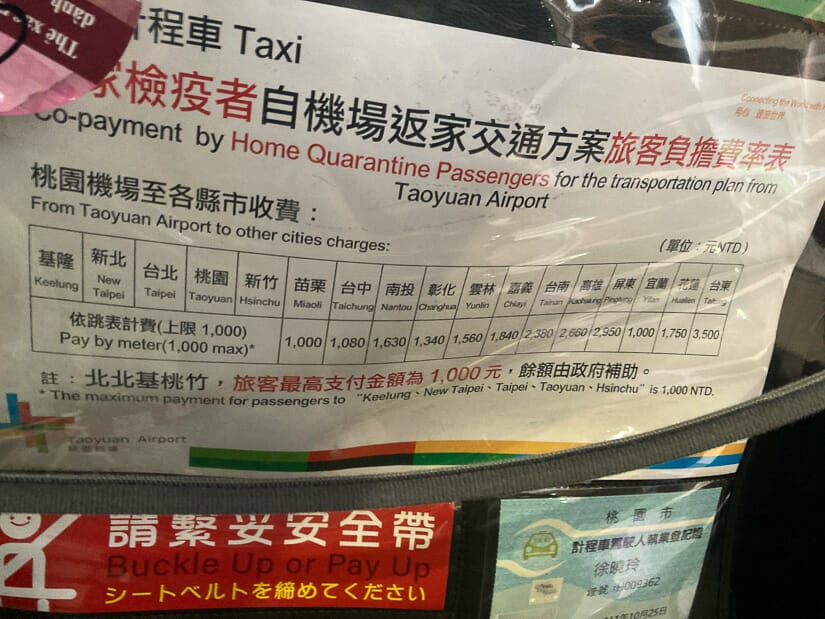
- Upon arrival at your quarantine location, enter your hotel/residence immediately and don’t leave until until 12:01 AM or later of the 4th night. If you are caught going out, the fine is extremely high.
- Then, from days 5 to 8, you are in the “self-initiated epidemic prevention” period. The rules are different than the previous “self health management period”. Before, that basically meant you could leave, go out, stay with family, live like normal but just avoid crowded indoor places and monitor your health situation. For the new “self initiation epidemic prevention” period, the rules are stricter. See the next section below.
- On the day of your arrival at your place of quarantine, and every day or other day after that, an English-speaking agent will call you to check in on you and ask if you are feeling okay. Make sure your phone is charged and that you catch the call. If you miss it, they may send someone to check on you (although the agent admitted to my wife that they are too busy nowadays, so they will probably just try to call you again later. You can also ask this guy about garbage pick up.
- If your airport saliva test turns out positive, they will contact you and advise you on how to proceed. If you’re alone, there’s a chance you will be able to stay where you are in quarantine but for an additional set number of days, or they may come pick you up and take you to a government facility. If you’re a family and only one tests positive, that person will may be taken away.
- It is possible an agent will come to check your quarantine location to make show it meets standards, but they seem to be doing this less now. My wife also got a call from the local neighborhood leaders. He then dropped off a package for us containing some garbage bags and masks.
- Obviously, do not leave your place of quarantine, even stepping outside or down the hall, for the first 3 days (technically 4 nights).
Post Quarantine: Self Health Management Period VS Self Initiated Epidemic Prevention Period
In the past, arriving travels had to undergo a period of “self health management” after quarantine. This meant always wearing a mask, watching your health, and avoiding busy places. You weren’t supposed to eat in restaurants (in practice, nobody was checking), but convenience stores or shopping for groceries was allowed. Public transportation and exercising outside were OK, too. You weren’t supposed to visit a hospital/clinic or make any doctor’s appointments during this time.
Under the new 3 + 4 program (technically 8 nights), the first 4 nights (day zero plus 3 days) is strict quarantine. The last 4 days is called “self initiated epidemic prevention”, and the rules are different. It started out as being much stricter (you basically had to stay in the same quarantine location, and could only go out with permission for “necessary tasks”). Since then, the rules for the last 4 days have loosened a lot. You are now allowed to change to a new place, go out more easily, and can move into a place where other people are living, as long as you have your own bedroom and bathroom there. You are still supposed to avoid going to very crowded places or hospitals in that time, though.
From September 29 to October 12, you will be allowed to do all of your quarantine in a house where other people (friends or family) live, so long as you have your own room and bathroom. You still aren’t supposed to do it in a regular hotel though, and Airbnbs have never been allowed, as they are technically not even legal in Taiwan.
Until spring of 2022, everyone was supposed to download and use the Taiwan Social Distancing App (臺灣社交距離) . This was the country’s way of tracing all COVID cases and notifying those who have been in contact with a case. However, with the explosion of local COVID cases in May 2022, the contact tracing system collapsed. They are no longer attempting to trace every case, so you don’t have to do this anymore.
If you were vaccinated in Taiwan, you can apply for your digital vaccine certificate , which may be required to enter some restaurants, gyms, night clubs, and so on in Taiwan (Note: in the two months I recently spent in Taiwan, I was never once asked for this). The system only works if you got your vaccines in Taiwan, because then you will already be registered in their system.
If you got your vaccines abroad and have a good vaccine card issued by your country, you can just show that, if you’re ever even asked for it. Just have the document/QR code ready to show on your phone if needed.
Do I have to wear a mask all the time once I’m in Taiwan?
Not quite, but almost. For most of the pandemic, Taiwanese have followed the rule of near universal mask wearing while in public. For example, most locals can be seen wearing masks even outdoors, even while walking down an empty street by themselves. The rules were slightly loosened on July 19, 2022. Currently, these are cases when you DON’T have to wear a mask, but some locals may still wear them in these cases out of respect for others or because they are still worried about getting COVID:
- While at home or inside your hotel room
- While riding a scooter or bicycle
- While exercising (indoors or outdoors), playing sports, at the pool, jogging, etc.
- While hiking or at the beach, forest, or mountains
- While taking photos, videos, giving a speech, etc.
- While eating, drinking, or smoking
For more information, see the official announcement here .
Even at the time that Taiwan fully opens to tourists and drops quarantine on October 13, 2022, these mask rules will stay until winter or longer in Taiwan. So if you can’t stand the thought of wearing a mask almost all the time while in Taiwan, you may still want to further postpone your trip until the mask rules change. And even when they stop enforcing the mask rules, many Taiwanese people will probably still continue to wear them for months or even years to come, as mask wearing was already common even before COVID started.
What Happens If I Test Positive on Arrival?
Every day, several people test positive upon arrival in Taiwan. Because they now only do saliva tests at the airport and you leave before the results are ready, you’ll be notified later.
If this happens to you, you are expected to report it, and you will most likely be asked to stay at your current quarantine location (in the past, you would have been picked up and taken to a quarantine facility).
In the case of traveling with family members, I used to recommend packing your luggage separately (one bag for each person) in case you got separated at the airport, for example, if only one person tested positive and was taken away. Now, I would say to at least be mentally prepared for the possibility that, within a day or two of arrival, if only one of you tests positive, they may suddenly call you and tell you that you have 30 minutes to pack a bag before they come pick you up.
The government quarantine facilities vary, and aren’t much different than a regular quarantine hotel. They could be located anywhere in Taiwan. The same friend I mentioned above got sent to one in Nantou, in the middle of Taiwan, where he had a lovely natural view out a large window that he could easily open (a much desired feature in regular quarantine hotels).
However, many people complain that the government facilities are stricter than the regular quarantine hotels. They may check your luggage for liquor and other prohibited items, which regular hotels won’t do. They are also stricter about ordering food in, like it can only be done at very specific times or can’t be done at all. And instead of self-administered rapid tests, a nurse will actually come in and do the test on you.
On the plus side, these facilities are free! However, if you’ve already booked a quarantine hotel, it may be too late to get your money back. You could at least try for a partial refund. At the end, when you take a taxi onward to wherever you’re going next in Taiwan, you’ll need to pay for that.
In the case of families traveling with children, if only a child tests positive, one parent will be able to go with him or her. When separated like this, if the quarantined COVID-positive person tests negative on the first two tests done in room (days 2 and 4), he or she will then be allowed to rejoin his/her family wherever they are quarantining. It might take a day to process, so you could expect to be rejoined on day 5 or so.
What happens if I test positive later in Taiwan, or come into contact with a positive person?
As of Tuesday, April 26, 2022, the rule for those who’ve been in very close contact with a COVID-positive person was “3 + 4”, meaning you had to isolate for 3 days then follow self health management for 4 days but on May 16, 2022, the government announced this was no longer required. Now, if you’ve had three doses of vaccine, you don’t have to isolate, even if a close contact (like family member or close coworker) tests positive, so long as you yourself aren’t showing symptoms.
If you’ve done a rapid antigen test on yourself, come up positive, and you have no symptoms or mild symptoms, you should call 1922 to report that you have COVID and then follow their instructions. You will most likely be told to isolate until you recover. Do not go to a hospital or clinic. Elderly people (75+) or babies (2 and under) may still be sent to a hospital, even with mild or no conditions.
If you have serious conditions, such as strong chest pain or trouble breathing, you should seek medical attention immediately.
If you suspect you may have come into contact with a COVID case, do not go to a hospital for testing; the hospitals are overwhelmed and have asked people not to do this.
Quarantine Hotels
Taiwan’s quarantine hotels are essentially regular hotels that have adopted all the protocol in order to qualify as quarantine hotels. Choose carefully, as you’ll be stuck in the same room for the duration of your quarantine period!
Prices include three meals a day, which are brought to your room. Unfortunately, most of them only offer a full refund up to two days before arrival, so if you test positive at the airport and get sent to a government quarantine facility, you may not get all of your money back from the hotel. (Note: at least the government facilities are free).
How to Book a Quarantine Hotel
If you are arriving in Taiwan before October 13, 2022, you will still need to book a quarantine hotel.
The most popular search engine for booking quarantine hotels in Taiwan is Mr. Host ( booking site / Facebook page ).
There are so many hotels available that choosing one can be intimidating. Also, the Mr. Host site can be difficult to use (when I tried, the “check availability” on some hotels button didn’t work), and sometimes the final price or room features are different that what is first shown, which is frustrating.
However, the Mr. Host team is very helpful, and you can even message them with a list of things you are hoping for in a room (for example, window, balcony, adjoining rooms, children’s facilities) and they will give recommendations. Their staff is highly knowledgeable about current restrictions, and they publish some useful flowcharts explaining the quarantine process in Taiwan; follow their Facebook page linked above to see them.
You can also contact and book hotels directly. The government has prepared this website listing all the quarantine hotels by location across Taiwan. Unfortunately, they don’t provide emails or website links.
Two other sites where you can book Taiwan quarantine hotels are AsiaYo and KKDay . Don’t use regular booking sites like Booking dot com , which I normally recommend, for booking your quarantine stay in Taiwan.
If you find the quarantine hotel booking sites difficult to use (or the end results aren’t matching what showed when you originally search), you can always just use these sites to find hotels, then contact the hotels directly to book.
When contacting hotels, many will ask you to use the LINE app (which is universally used in Taiwan) to communicate, fill out necessary forms, etc, so you’ll definitely need to download that.
How Much is a Quarantine Hotel?
Deals on quarantine hotels can run as low as NTD500 per night, but this is not easy to find. 2000+ is the norm. It’s easier to find cheaper ones if you look outside of Taipei.
At the other end, they can easily cost well over NTD5000 per day, meaning you’d be dropping $55,000+ for your stay. For that price, why not book a trip to Hawaii? I recommend booking your quarantine room at least a month in advance.
Recommended Quarantine Hotels
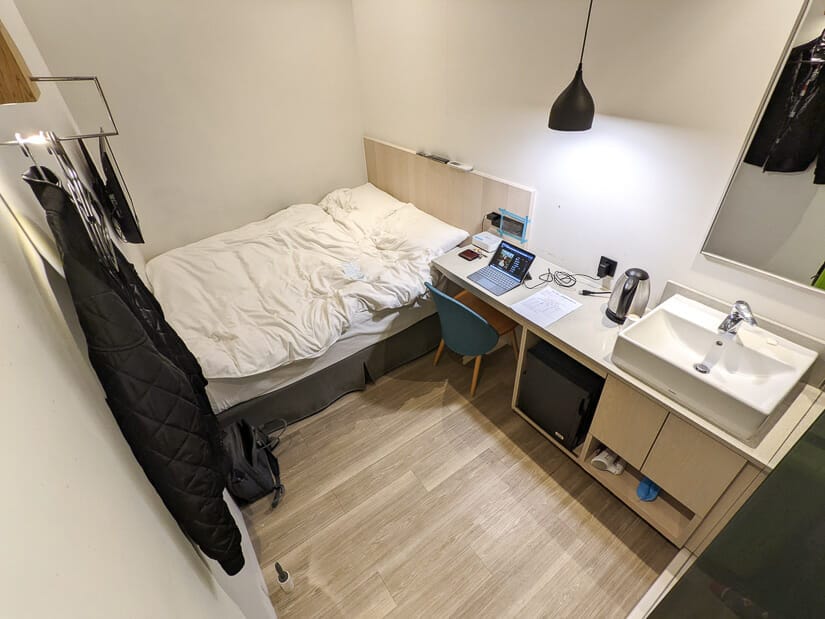
The following are quarantine hotels that have come highly recommended by other travelers:
For families : Freedom Design Hotel (富立登國際大飯店) , close to airport and offers various items needed for young children, such as cribs and bath tubs at no extra cost.
Another family-friendly option : Amba Songshan , adjoining rooms available
For those who can afford it : Hotel Proverbs , deluxe rooms have balconies, exercise equipment, and more.
Another luxury choice : Miramar Garden Taipei
Another option with balconies and exercise equipment : Chez Nous Da An
Low-budget quarantine hotel in Taipei for solo stay : Meander 1948 (pictured above)
Taichung quarantine hotels : North District L Hotel and Cloud Hotel
Tainan quarantine hotels : Taiwan North District B Hotel (low budget) or Anping District A Hotel (large rooms, windows)
Kaohsiung quarantine hotels : Long Siang Hotel (low budget) or Legend Hotel Pier 2 (colorful rooms with windows)
What’s it Like Staying in a Quarantine Hotel (including the food!)
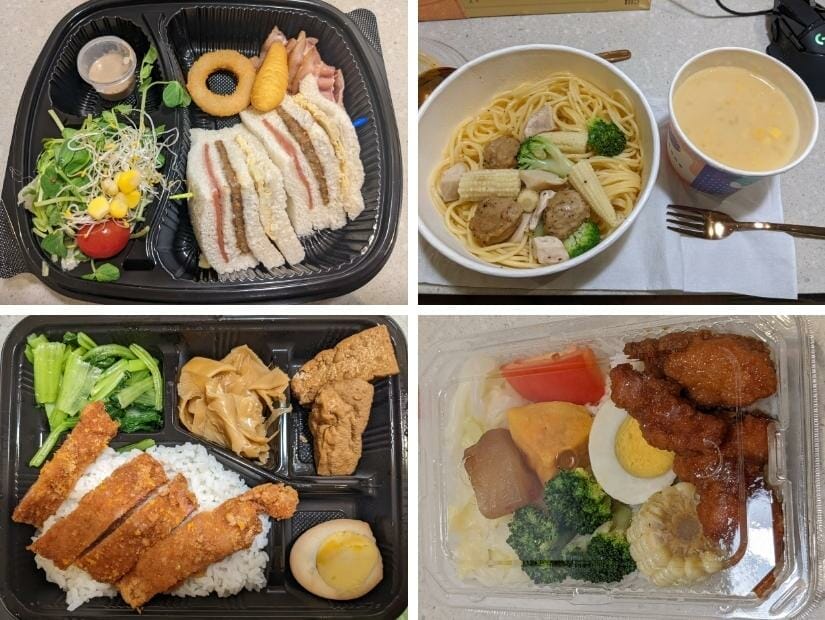
Quarantine hotel rooms vary quite a bit. Some are small windowless boxes, while others are luxurious, multi-room suites. The owner/staff may or may not speak English. They may provide you with the LINE address so you can communicate with them throughout your stay. Most provide all the information you need and a detailed list of rules for your stay.
Getting a room with a window is highly recommended for sanity’s sake, especially for those wishing to adjust to the time change after a long flight from around the world. Balconies are rarer in Taiwan, so you’ll have to pay more for a room that has one.
You’ll want to come prepared with ways to pass the time, especially with kids. Consider bringing a yoga mat for exercise and sticking to a regular schedule. Many people have reported that the meal time becomes their favorite, most exciting part of the day. Is this what prison is like?
Some of the most common complaints about quarantine hotels are about the food. I’ve seen a lot of pictures, and the food looks fine to me. It’s mostly Taiwanese, so you can expect sandwiches or steamed buns for breakfast, lots of lunchboxes (a bed of rice with veggies, meats, eggs, tofu, etc. on top), noodles, soups, and the like. Those with dietary restrictions of course should inform the hotel in advance and they will cater to it.
Some people get tired of eating Asian-style food every day, but the biggest issue is that the food comes lukewarm at best, or often cold. Microwaves are rare in Taiwan, so don’t expect one in your room unless it is explicitly stated. Many people say they wish they’d brought in a hot plate, or actually did (this may not technically be allowed). I’ve ever heard of people using things like hair straighteners to warm up their food.
You’re allowed to order food and groceries to your room. The most common delivery services are Food Panda and Uber Eats . Some hotels many only allow you to order at specific times, or they’ll hold it until that time (so it will be cold). Most hotels also allow you to receive packages from friends or family on the outside, but some many check them for prohibited items before giving them to you.
Is alcohol allowed in quarantine hotels?
Most quarantine hotels technically don’t allow alcohol in the quarantine rooms. That means you can’t order liquor in with your groceries, nor can friends drop it off for you. However, some quarantine hotels DO allow it. If you really want to be able to, you can ask hotels about their alcohol policy before booking. I would say there’s a good chance this would be easier to find outside of Taipei.
Having said that, hotels won’t check your luggage when you arrive, so you can take the chance bringing some hard liquor or wine in them.
Note that government quarantine facilities (where you’re sent if you test positive) are stricter, and may actually check your luggage and confiscate prohibited items.
If you’re quarantining at home, you can of course enjoy whatever drinks you want, so long as you know someone nice enough to drop them off for you. You can’t order liquor online.

Applying for a Quarantine Subsidy
When Taiwan first started its mandatory, self-paid hotel quarantine system, the government offered subsidies (around NT1000/day/person) to everyone who underwent it.
Now, however, it’s much more difficult to get one. Only Taiwanese citizens can apply, and they need to demonstrate a very compelling reason they had to leave the country, for example treatment of a life-threatening disease that can’t be done in Taiwan. You also can’t be earning income while in quarantine, among other rules. In other words, don’t hold out any hope for getting one.
Having said that, we recently found out that we actually do qualify because we left Taiwan before COVID started and haven’t been back since. So if you find yourself in this case as well (citizen or ARC holder, left Taiwan before COVID started, coming back and quarantining in a hotel, not earning income while you quarantine), you may be in luck. Also note: if you feel you qualified for the subsidy in the past, you can apply for it up to six months after the quarantine time. In the end, we didn’t get it, because we ended up staying in a friend’s empty apartment instead of a quarantine hotel.
Quarantining at Home
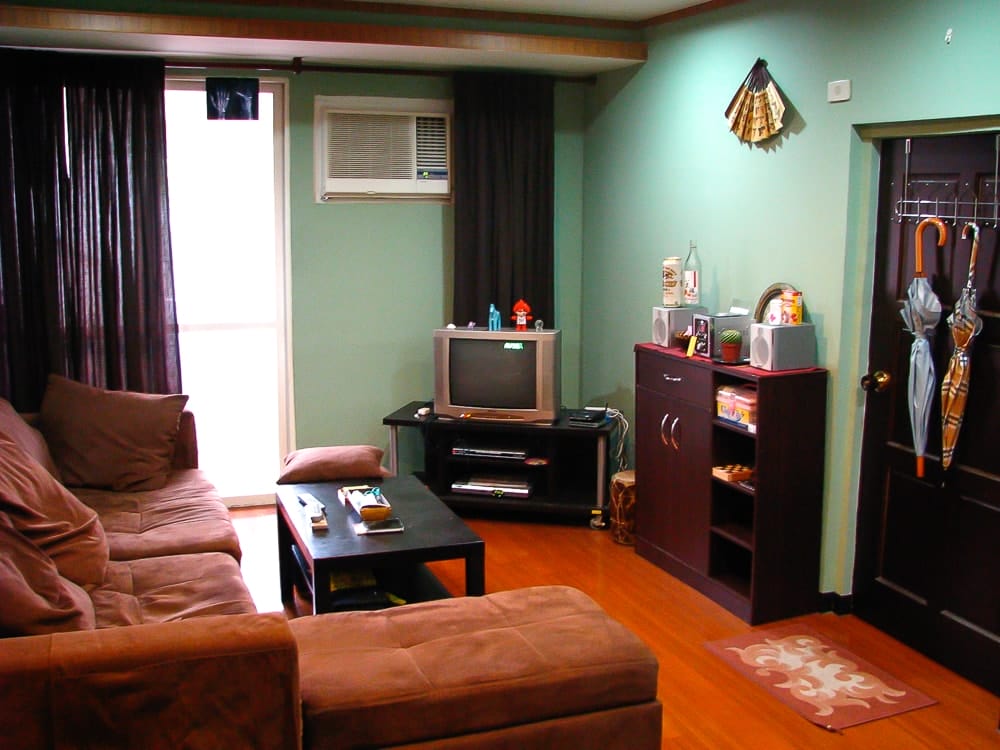
Ever since mid-March, 2022, people have been allowed to quarantine at their home in Taiwan instead of a quarantine hotel. At first, there was a “one person per residence” rule (exception: travelers with children), but in early April 2022, this was further loosened to “one person per room”. In other words, two people arriving together can quarantine together, as long as they arrived in Taiwan together, or even on different flights but the same day. No one else can be allowed into the house though, including family members who lived there before you arrived.
As of early September, you are allowed to do the second part of your quarantine (the 4 days) in a house with others, as long as you have your own room and bathroom. As of September 29, you can do the whole quarantine (3 + days) in a house with other people, as long as you have your own room and bathroom. From October 13, all these rules are dropped.
How to Quarantine at a Residence in Taiwan
If you’d like to quarantine in your apartment in Taiwan, or even that of a friend, the apartment must abide by the following:
- No one else can be in it during your stay, unless they arrived with you and you are quarantining together.
- The apartment has to have its own number. For example, there are many illegal top-floor apartments in Taipei. Their number is the same as the apartment below them. These do not qualify.
- The apartment has to have its own entrance. For example, if you have to walk into someone else’s house/apartment in order to access the staircase to that apartment, it doesn’t qualify.
- Communal staircase or elevator up to the main door of your apartment (like most residential buildings in Taipei have) are fine.
- The apartment can be anywhere in Taiwan, but you’ll have to pay the set fee for taxi transportation to get there from the airport where you arrive.
- There’s nothing else you have to do besides provide the address, and nobody will come to check on it. However, I’ve heard of people being forced to leave their apartment and check into a quarantine facility because of the apartment number issue.
- Note that the government will track your location during this time using your phone, and leaving your residence (even just stepping outside the door) can incur a huge fine. There have been several cases of people receiving enormous fines for leaving their residence during quarantine; one of them just walked down the hall.
Are Airbnbs Allowed for Quarantine?
In the first few months of Taiwan’s COVID quarantine system, staying in an Airbnb was a popular choice. However, it was never technically allowed. In fact, Airbnbs aren’t even legal in Taiwan. So no, Airbnbs are definitely not allowed for quarantining now, and unlike before, they now actively make sure people aren’t staying in them. Staying in a friend’s of family’s place, however, is fine, as long as those people stay away for the duration of your quarantine, and the apartment complies with all the above-mentioned criteria.
Well, I hope you’ve found answers to all your questions about Taiwan’s travel entry requirements and quarantine system. If you’ve still got questions, please comment below or join my Taiwan Travel Planning group and ask there to get the fastest answer!
Related Posts
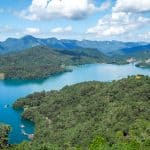
74 thoughts on “A Guide to Taiwan’s Quarantine Hotels and COVID Travel Restrictions”
If residents returning to Taiwan have had Covid but recovered how many negative tests do they need before flying back please.
I’ve just found out this information today and updated the article. If you’ve had COVID and recovered for some time, you just need to do your pre-flight test. So long as it’s negative, you’re good to go. If, however, you come up positive on your pre-flight PCR test, you need to wait 10 days, test again, then wait another 24 hours, and do a second re-test. If both re-tests are negative, then you can go. That is the formal rule according to the government site. According to someone who told me she did exactly this (tested positive, then waited 10 days and did the two retests), when she arrived in Taiwan, and tested negative on arrival, they didn’t even ask about whether she’d done these two tests or just the one. So it seems like this rule exists on paper, but may or may not always be checked.
Thanks very much for this informative blog. It is very helpful. My daughter is considering taking Mandarin at one of the state approved schools in Kaohsiung. A staff member there seems to be suggesting that she must quarantine there instead of locally in Taipei. Does that seem right? Above you mentioned a taxi fare of 2660 to Kaohsiung. That is NT$, right?
There are no government rules in Taiwan about where you should quarantine. You are allowed to find a quarantine hotel anywhere in the country, no matter where you plan to go after. Some people go outside Taipei simply because it is cheaper. I’m not sure why the school would want her to quarantine closer…Maybe so they can help her or drop off stuff if necessary. But that’s definitely a school, not government rule. As for the price, yes, 2660 is a set fare in NTD, and it is an extremely cheap/reasonable fare because it is partially subsidized by the government.
Hi there, Great article, this is the most detailed content I’ve read about the arrival procedures to Taiwan. I have a question about the quarantine system for entry form. I plan on leaving my phone behind for someone else to use. If I do not have a phone with me when I arrive at the Taiwan airport, how can I show them the text with the link? Do you know if there is a workaround for this?
Good question. I haven’t personally experienced this or talked to someone who has, so I can’t say for sure. I would suggest that you make a printed copy of the final form that you see upon submitting the forms. It is called the “Quarantine System for Entry – Departure Place Declaration Certificate”. Then, when you arrive in Taiwan and purchase a new SIM card, approach one of the officers, tell them that you lost your phone, and show them the printout. They should be able to help you. But if you don’t even have any kind of proof, such as the printed form, it could be problematic, and I can’t say for sure what will happen. Best of luck!
Great website – super informative. I am travelling with my 7 month old from Vancouver to Taipei this week. Do you know, with the recent changes, if children who are holding foreign passports (with Taiwan visa) need to take the pre-arrival PCR? The airline advises that they would likely need to but could not confirm. CDC website has no mention of it, either way. Any accident would be appreciated!
Hi Katherine, the requirement for pre-PCR testing is being removed for EVERYONE starting July 14 Source: https://www.cdc.gov.tw/En/Bulletin/Detail/W0PeXU928EGDh6jpHsEwGQ?typeid=158
Do quarantine hotels have wi fi? How does a person obtain food and other necessities during quarantine?
All quarantine hotels provide meals, but you can also order groceries or meals from restaurants using Food Panda or Uber Eats. And yes, all quarantine hotels have free WiFi.
Hi Nick, Thank you for your infos. This is definitely the most detailed article about Taiwan entry procedures I’ve read so far. My wife and I will be traveling to Taiwan to finalize our international adoption and bring our kid home. Quick question about the quarantine hotel. Are married couples allowed to quarantine in the same hotel room? Or do we have to book two separate rooms? 8 days at the current prices it’s already a lot of money for one room….
Hi Luca, the rule for this has changed several times so I can’t say 100% for sure what it is right now. I would suggest asking in the “Quarantine Support in Taiwan” Facebook group for people’s recent experiences. You can also try contacting Mr. Host, as they are responsive and familiar with the current rules.
Your article is a gold mine, thanks a lot for sharing your experience with Taiwan’s quarantine. I was thinking about taking an Airbnb, but as you explained it’s technically not allowed. Do you have any clue about how the autorities know if your flat is an Airbnb or a long term rented flat ?
Hey Nicolas, to be honest, I can’t imagine them really putting in the effort to check. But if they did (and they might), most places on Airbnb in Taiwan are listed on other local homestay booking sites, so if the authorities were to do a quick check of the address, it would likely come up. However, in my personal experience, when we tried contacting several Airbnb places last year, none of them were willing to host us for quarantine anyways, so that may be the biggest obstacle. Personally, I wouldn’t chance it.
Ok thanks for the answer ! I got in touch with an airbnb owner who helped me to find an appropriate flat for quarantine. So this major obstacle that you had wasn’t one for me. I’m still hesitating as my teacher said that foreigners couldn’t stay in private places and HAD to go to a quarantine hotel. Have you heard about this ?
There is so much misinformation about COVID rules. Even some hotels and people working for the government helpline provide inaccurate information. So don’t listen to your teacher. However, I’ve heard of some schools who want their students or teachers flying in to do a certain thing, so it could be that. There is definitely no rule that foreigners can’t stay in apartments. All that matters is that the apartment meets the guidelines set out by the government.
Hello Nick, Thank you so much for your excellent article. My problem is, I do not find any available Quarantine hotel for August 15th (arrival). I was scared by the political situation and did not book one or two months in advance. Is there a way to claim an emergency situation (I could rent a one room + bathroom apartment in my wife’s village, but its in the 5th floor of a high-rise with 7 more apartments and I guess the house number is the same. The elevator is used by everyone in the building…)? I must go back next week, because otherwise I lose my 5 years continuous stay condition to apply for the Permanent ARC…
Hi Paul, I don’t think there’s any exceptions like that for emergency situation, but to me it sounds like the apartment you described would qualify. The question to ask is, does the apartment have a unique address? Like if somebody sent mail to it, would it only go to that apartment, or do the other apartments on the same floor all share the exact same address? For example, in the past I lived in an apartment above my landlord’s apartment. My apartment was an illegal added-on suite, so when I received mail, it went to my landlord’s apartment and he gave it to me. So for that apartment, it would not be OK. If yours has a unique address, then it should be fine. Shared elevator or stairs for getting up to it is fine, too. Just try not to ride with other people.
Hello Nick,
Like so many others who have posted comments/questions here, I thank you for explaining in detail the current process of obtaining entry into Taiwan (and for your entire website, very useful and fun).
I’m eligible to receive a visitor’s visa as my son lives in Taiwan and holds an ARC certificate. I’m planning to visit from October through December 2022 and have reserved an Airbnb apartment in Linkou.
After spending your first four days in a quarantine hotel, you can move to a different place if it meets the “one person per residence rule”. The address of the Linkou apartment begins “17, No. 10, Lane nnn, Section n, xxx Road, Linkou District, New Taipei City 244, Taiwan” etc. so it appears to have a specific address though I’m not sure. If so, would the CECC/CDC regard this apartment as a suitable accommodation for the four-day self-monitoring period and allow me to move?
You were unsure about this in your article, though perhaps you have come across additional information that would help answer my question.
Great thanks and happy trails, Russell
Hey Russell, just to further clarify a few points about the 3+4 days: 1. For the first 3 days (technically 4 nights as day 0 doesn’t count), Airbnbs are not allowed. 2. For those first 4 days, regarding the address, the main point is not that the apartment has an address. It is that this address isn’t shared with another apartment. For example, some landlords in Taiwan who own an apartment will build another apartment (often illegally) on top of it, on what used to be the roof of a building. I used to live in one. It looked like a normal top floor apartment, except that my address was the same as my landlord’s so he never registered mine. So when I got mail, it would go to him, and he would bring it up to me. Another example would be a landlord who takes one normal apartment, and divides it into several apartments. So they all have the same address, but are rented out as if they were individual apartments. These examples of apartments are what the government is referring to as not qualifying. So the important point here is not that said apartment has an address. Everywhere in Taiwan has an address. The important thing is that it has a unique address, as in it is not like the above examples of apartments added illegally or created within a pre-existing apartment. 3. For the 4 days of “self initiated epidemic prevention (note that this is a little different than the old “self health monitoring”, there are no particular rules about the place where you stay. The rules only said that it would be “ideal” if you stayed in the same place, but as you’ve pointed out, you are in fact allowed to move. So to answer your question, from what I’ve heard from people arriving in Taiwan, the CDC does not/will not check the place where you stay for the final four days. In fact, they seldom even check the first place people stay for their actual quarantine. They didn’t for us, but I know they sometimes do. The final four days are basically the honor system. On top of that, the rules about what people are allowed to do in the final four days are quite vague, anyways. In my opinion, you can move to wherever you want for those 4 days, but you should still try to avoid going to crowded public places. 4. Given that you are arriving in October, I wouldn’t be surprised if these rules have changed again by then. If you’re lucky, we’ll be on to a 0+7 day system or something like that. I hope this helps!
Thank you so much Nick for your detailed and very helpful reply! I do hope you can re-engage travel into your life and career as the world adjusts to a post pandemic world. Now I’m going to investigate your Taiwan travel planning group. Cheers, Russell
Hi, Nick! I have a question re: quarantine protocol in TW. This is what appears on the booking page of quarantine hotels. I’m looking for a quarantine hotel for 4 days (0 arrival day + 3 days quarantine period) and the remaining self-initiated monitoring will be done at my apartment. However, it says that one “must apply to the local government and sign the statement of changing location”. Question: How can I acquire this form from the Hsinchu city government (where my apartment & workplace is located) so I can sign it and prepare before my arrival? I will then show this form/slip in the airport and also in the quarantine hotel I suppose, right? Thanks, Maria
Hi Maria, first, you won’t need to show this form upon arrival at the airport. Unfortunately I haven’t personally moved from a quarantine facility to my own residence, so I’m not exactly sure what the procedure is. However, I do know that once you arrive in your quarantine location, an English speaking officer will be in touch with you and I would assume will be able to guide you through whatever needs to be done to make the switch. I would suggest posting this question in the “Quarantine Support in Taiwan” group, because there will surely be people in the group who have recently done this and can share their experience. Hope it goes well!
Thank you x 1,000! This has been an awesome resource for someone (me!) travelling to Taiwan tomorrow.
What is the status of the old electronic “Arrival Card” for immigration purposes? Has it been superseded by the “Quarantine System for entry” (hdhq.mohw.gov.tw)?
I went to complete the immigration card online (niaspeedy.immigration.gov.tw/webacard/) and received an error message in Chinese that “The system is being adjusted and is temporarily closed.”
Did you complete an Arrival Card online for your recent trip?
Thanks Steve
Hey Steve, yes, it has been totally replaced with the Quarantine System for Entry, and everyone needs to complete this with 48 hours of arrival in Taiwan.
Thanks for this, I just wanted to ask: my flight is supposed to get in at 5am ish, and the drive from Taoyuan to Tainan is around 3 hours, but my reservation doesn’t start until 4pm that day. Will I still be okay? Do I have to add an extra day?
For this question, it’s going to vary by hotel, so you’ll need to contact the hotel and ask. If you’re lucky they might let you check in early, but I wouldn’t be surprised if they charged a fee or extra day for early check-in. You won’t be allowed to just stand around or go for a walk while you wait, though. Best of luck!
Thank you so much for your incredibly informative article! I only wish I had come across it earlier, I did NOT realise how in demand quarantine hotels are, my trip might end up suffering a lot from it…
You mentioned Airbnbs are not allowed for the first 4 nights of quarantine – does that mean that they are for the second 4 nights? As in, could I book a quarantine hotel for the first 4, and then move to a 1 person per residence Airbnb for the second 4?
Thanks so much again! Órla
Well, an Airbnb or another hotel – could I spend my second 4 nights in a non-quarantine hotel?
Hi Orla, Airbnbs are actually illegal in Taiwan, so they have never technically been “allowed” for any kind of quarantine, although some people were able to stay in them when COVID first started. You also aren’t supposed to do spend your second 4 days in a regular hotel. Only hotels that have been set up for quarantine or self epidemic prevention (i.e. the second 4 days) are allowed. You can find out by asking the hotels if they allow it. The rule that you’re allowed to change to a different place after the first four days states that the new place can be your home, the home of a friend of family members (but you still need to have a room and bathroom to yourself), or a different quarantine hotel. If you were to just book an Airbnb, I don’t think they are going to look so closely (how would they know that it’s not just your friend’s house?) But I also don’t want to tell you that it’s OK to do so, because if you got caught, there could be a big fine. I also feel you’d probably need to inform the Airbnb that you’re doing your second 4 days there, however there’s a good chance most Airbnbs won’t want you to stay there if they know that. It’s a tricky situation! I would suggest you also ask in the “Quarantine Support in Taiwan” Facebook group to see if anyone else has experience with doing this.
I am coming next week, unfortunately all the sites mentioned don’t have any room available in Quarantine hotels from 24-28th August. I am left with no option but to book through AIRBNB. Could you please guide me what steps can i take for booking like book entire property, check if they have seperate entrance etc.
Hi there, I can’t guide you through the steps to do this, because Airbnbs are technically illegal in Taiwan and not allowed to be used as quarantine locations. If it’s your only choice, though, then the best you could do is contact them directly and ask them if they are willing to let you stay there for your quarantine, and what the process is, but heads up that there’s a good chance most of them will NOT be Ok with it.
Thanks for all the insight. It took a lot of stress out of the process. One thing that was amazing to me is how important a cell phone is for the system. And my brand new iPhone 13 was not “unlocked” so the Taiwanese SIM card didn’t work. Luckily I had my older iPhone 12 with me too.
Good to know. I’ll add that tip to the article!
Hi again Nick
Thought I’d give you an update as I did test positive from the saliva test taken at the airport. As you suggested, I was picked up a couple of days into my quarantine hotel stay and taken to a government quarantine facility. The first change to the info that you have is that I only had to stay at the government quarantine facility until the 8th day (rather than 10 days). I also did not have do any testing to leave. The government quarantine facility gave me the option to leave at 12:01am on the 8th day, or 7:00am. This was a bonus.
And as an added bonus, the quarantine hotel refunded two night’s accommodation (they charged three nights “cleaning fee”) and 5 days of meals. I wasn’t excepting anything… so very happy!
Thanks for updating us with your experience. I’ll add the info to the article!
Hi Nick, Thanks for all the information. Regarding the first 3 days of quarantine, my flight will arrive at 5am on Monday. Does that mean I cannot leave the quarantine hotel until 12:01am on Friday? And therefore, regardless of how early or late in the day I arrive, my release time is the same, correct?
Yes, that is correct. We had the exact same situation when we last visited.
My son (also Nick) and I are taking a fairly last minute trip to Taiwan since they relaxed the rules earlier this month. I managed to book a quarantine hotel for the first 4 days on the outskirts of Taipei. I wanted to stay in Taipei for the last 4 days to be able to move about easier during my self initiated epidemic prevention. We don’t have a personal place to stay so it sounds like I have to stay at another quarantine hotel? And what do I tell the hotel in terms of not needing to be locked up and order food for all my meals? Is there a different way to book it? It sounds like I can’t just book any hotel. Thanks for your insight.
Hi Andy, unfortunately you are not allowed to stay in a regular hotel for the second part. I would suggest contacting Mr. Host and they can provide additional suggestions for places that will take you for the second part. Best of luck!
Any idea on the accommodation for tourist if we were to travel during 0+7 Self Initiated Epidemic after 13 Oct? Must we stay at hotels 1 person 1 room?
The rule is officially “1 person per room/bathroom”, but you are allowed to share a room with members of the same family or “household”. The rule is vague and open to interpretation – for example, two friends living together can count as the same “household”, and they aren’t really going to check.
I’m so glad i came across your very informational article in preparation for my trip to Taiwan in a few weeks! I was wondering if you had any idea on whether or not during the 0+7 self initiated epidemic you can book a regular hotel for less than 7 days or do you have to book the full 7 days in the hotel to do the self indiated self initiated epidemic?
Thank you, Sal
Hi Sal, there is no rule against changing rooms/locations during the 0+7 days.
I’ve loved so many of your Taiwan travel articles…. from our pre-covid 2019 trip with our then toddler, we borrowed so much of your advice. Thank you!
We’re planning to travel back in November and I’ve been so confused by what the self-initialized quarantine prevention (0+7) would look like.
Is it known if we’ll still need a quarantine hotel (for the first 8 days upon arrival)? Or if we can immediately stay at a normal hotel? It seems some hotels in Taipei say its ok, but most I’ve inquired with in Tainan say we can only stay after the self-initialized prevention window.
Either way it sounds like we could still move around (5 nights in Taipei and 3 nights in Tainan (travelling by HSR)? Did I understand that correctly – can switch hotels during that 7 days, and can take public transit?
For the hotel, I assume they would allow a 6 year old child to stay with at least one of the parents(we’re a family of 3 – but usually get 2 rooms anyway because bedding options are so much smaller than we’re used to in the USA)
Hi Victoria! The 0+7 is very lax. You can stay in any hotel or accommodation that will take you. Some are still hesitant or not ready to open their doors yet because they are either still afraid of COVID, or they haven’t been officially notified or informed yet about what will and won’t be allowed from October 13 – the authorities always tell the press first, but hotels don’t get officially notified until later, and they wait until this comes before implementing the new policies. This should change in the coming weeks, and more hotels will be ok with it. The only official rule is that you’re supposed to have your own room and bathroom, which means hostel dorms are not OK, or budget hotels where you share a bathroom with other guests. You are allowed to stay with your own family, so your whole family can stay in one room if you want. And yes, you are allowed to move around or change hotels. The only rule is that you are supposed to do a rapid test to confirm you don’t have COVID before going out in the first week. One test covers you for 48 hours.
Thank you for this very informative site. I’m arriving on the 19th of October and thought I had it all sorted and then they changed the rules. Now I’m wondering if everything on arrival will be changed. 1) online health form – still need to fill this out? 2) local SIM card – still need this? 3) will there be quarantine taxis? Or can we just take HSR/ trains? I know those first arrivals haven’t happened yet so maybe we need to wait until Thursday to find out?
1. You no longer need to fill out the online health form. 2. SIM card is not necessary, but it would be useful for having internet access while traveling around. A WiFi router will also do. 3. You can take public transportation from the airport.
Basically it will be travel as normal before COVID. The only rule is that you are supposed to stay in your own room with your own bathroom (by yourself, or with family members that you entered taiwan with) for the first week. In other words, you can’t stay in a hostel dorm or a room that has shared bathroom with other guests. Also, you will receive 4 rapid tests when you enter taiwan, and you are supposed to take one before going out to make sure you don’t have COVID (one test covers you for 48 hours).
We want to do a layover tour (approx 6hrs) in November. Not looking to book a hotel, just travel around and see a few sites. We are both Canadian citizens, coming from a vacation in Vietnam. Our layover is in Taipei before heading back to Vancouver.
At the airport do we need to provide proof of our one person per room residence for the 7 day period of self initiated prevention? Or do they ask you these questions?
We were planning on hiring a private car to pick us up from the airport and then take us back to the airport a few hours later (we weren’t planning to stay in a hotel anywhere).
If customs asks what our plans are in Taiwan and we tell them it’s a layover tour will that not be allowed?
Hi Anna, Taiwan is almost totally open now as before COVID. Canadians can enter for 90 days visa free. There will be no such questions at the airport. Even if you are staying longer, they won’t ask for any proof about the type of accommodation. Layover tours are perfectly fine. Just make sure you get back to the hotel in time! Also note, the Airport MRT is even faster than a taxi to the city. They take 35 min or 50 min to Taipei Main Station (every second one is express), while a taxi can take up to an hour. Then, as long as you plan it well, you could see a few sights on your own before returning to the airport. However, if you want the taxi for the day to take you to several sights, that would make sense.
Thank you so much for your insight on this! Any idea on how long I should budget to get out of the airport? We did a layover tour in Beijing once and it took almost two hours just to get out of the airport 🙁
During COVID times, it was taking 2-4 hours to get through. However, now that there are no COVID arrival procedures or testing, it should be back to normal, which is usually 1 hour or less.
Do you know if 4 friends, arriving same day to Taiwan, from 4 different households, stay in one/two rooms together or do we need to book separate rooms? We are renting a car & doing road trip over two weeks. So, we will be together over the entire trip.
Technically the rule says you are supposed to be the same household and arriving same day. But they don’t have any way to know if you live in the same house abroad or not. They aren’t going to check.
Thanks for getting back to me. I think I will wait until these restrictions are lifted. Hopefully soon. It makes it difficult to plan a trip.
Hi. I will be travelling to Taiwan for 8days. During 0+7 self initiated epidemic prevention, can I go sight seeing around Taipei and taking public transport?
Yes, you can travel around as normal, just need to wear a mask. You can also change hotels or leave Taiwan during that time if you want to.
Thanks for an elaborate write-up. Very informative indeed.
I am planning to visit Kaoshiung Feb2023. With the 0+7 COVID policy in place, do ALL HOTELS accept foreign guests? I am from Malaysia and will be booking hotels via Agoda/ booking.com where no such condition is stated but I read some hotels might turn away foreign guests. I wonder if that particular article was updated. I just don’t want to be left stranded.
Please help clarify. Thanks
The hotels SHOULD allow anyone now, but the truth is that some still are not. Some of them are still worried about COVID or misunderstand the new rules. So I’ve heard of people having their reservation turned down. But if this happens, you will find out right away. If you make the booking on booking dot com or Agoda, the hotel will check it as soon as you book qnd they will cancel it or let you know right away (this happened to me once). Then you can just try another. I never heard of anyone showing up to find out in person that they won’t let you stay.
Hi. After arrived(in Taoyuan Airport) is it possible to stay in hotel for a day before heading to my place unter the 0+7 Covid policy?
You can move around freely and change hotels or accommodations as you wish during the 7 days. There are no rules about this. The only rules is you are not supposed to stay in a room with strangers, such as hostel dorm.
Hi Nick, thanks for the write up! I’m travelling with my husband, do we need to book separate rooms?
No, travelers arriving in Taiwan together on the same day are allowed to stay together, so you can stay in the same room.
Hi Nick, What a great post so much information thanks so much! My wife does not have a cell phone and mine is a Trac phone which doesn’t work outside the US. Is it advisable to purchase a phone when we arrive in Taiwan?
That would be a personal choice – it is no longer required by the government to have a phone as part of the arrival process. Normally, people just use their phone from home but purchase a local SIM card or WiFi device when they arrive in taiwan, which is very affordable. If you have to buy a brand new phone just for your taiwan trip, that sounds expensive. Nowadays, almost everyone travels with a phone, so it does have a great deal of convenience. You can look up maps to find the way, look up bus/train times, make bookings, communicate with hotels, and more. Hotels almost expect in nowadays, and some communicate important info to their guests by email or messages. But sure you can still survive without one – I traveled to dozens of countries on my own before smartphones became a thing. Sure, I got lost sometimes, but I still survived!
Nick thanks for your reply I was under the impression that a personnel phone was needed so that the government could check on you during the quarantine period. I joined the Facebook group and find it very informative thanks for your posts.
You’re welcome! They did before, but that’s over now
Hi Nick, We (U.S. passport holders) will fly from Hong Kong via Taipei in early February on Eva Air to Tokyo Narita Airport. Our TPE-NRT Eva flight leaves (a layover of 19 hours) not until the next morning at 8:50 a.m., and I could not find any updated Taipei airport transit information on related websites such as Taiwan Visitor Bureau, Eva Air, or Taoyuan Airport. I called Eva Air here in LA, they asked me to call Eva Air Taipei airport direct. Unfortunately, the Eva Taipei phone line was always busy. My question: Do we allow to stay overnight at the Sheraton Taoyuan hotel? If this is not allowed, we have to cancel our flight. Thank you!
Hi Paul, yes, this is allowed. US passport holders can enter Taiwan for up to 90 days without applying for a visa. You when you arrive, just go through the normal immigration procedure to enter the country. You will need to fill in an arrival card and write the address of your hotel. Collect your bags and proceed to the hotel. Just make sure you return to the airport early enough (2 hrs) to check in for your flight the next day. Wear masks in indoor public places in Taiwan and taxi/public transport. There’s nothing else you need to do.
Thank you so much for giving the updated information. We are so relieved for now. Have a nice day!
Hi Nick, Thank you for the updated information! I hold a US passport and am currently living in Hong Kong. I plan to use my US passport to visit Taipei by myself to see friends on January 2, and will stay until January 6. I’ve also booked an ordinary hotel in Si men ding. Given the fact that Hong Kong is now an SAR of China, do you think there maybe any problems getting entry or getting admitted to the hotel? Thank you.
In terms of visa, if you use your US passport, you still won’t need one for up to 90 days stay in Taiwan. Taiwan recently introduced new rules for visitors from China. They have to do a saliva test upon arrival, and if they test positive, they have to stay in a quarantine hotel for 5 days. However, as far as I know, this does not apply to visitors from Hong Kong. Still, it’s best to ask your airline or Taiwan immigration for the latest info.
Thanks much for the valuable info.
I’ve not decided if I want to check in airport hotel during layover in TPE.
But I understand that card arrival requires name/address of hotel.
Can I just simply write any hotel?
Just worried that I’ll get caught if immigration officer ask for proof of hotel booking. Will this happen?
Appreciate your advice please.
Regards Keith
You are allowed to stay in a hotel during your stopover as long as your country has visa-exempt status for Taiwan. If it doesn’t you’ll have to apply for a visa first. You can Google the Taiwan BOCA list of countries to find out. As for hotel, you aren’t allowed to stay in a capsule room or dorm room (or any room shared with other random people) for your first 8 days in Taiwan. It’s not a matter of immigration “catching” you, but rather than the hotel will just check your passport and won’t let you stay if you are just arrived in Taiwan. You can only stay in a private room with your own private bathroom.
Leave a Comment Cancel reply
Taiwan announces end of quarantine for travellers from October
Self-ruled island is among the last economies to reopen to the world after shutting its borders to keep out COVID-19.
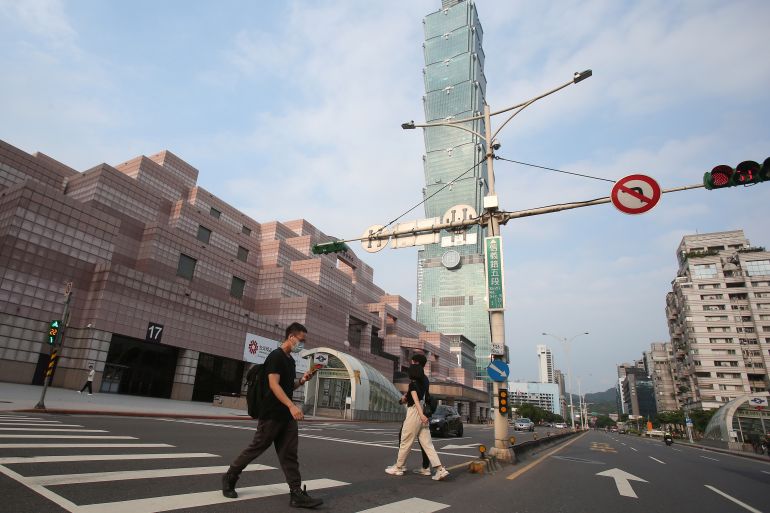
Taiwan will end its mandatory COVID-19 quarantine for arrivals from October 13 and welcome tourists back, the government has announced, completing a big step on its plan to reopen to the outside world.
Taiwan had kept some of its entry and quarantine rules in place as large parts of the rest of Asia relaxed or lifted them completely, although in June it cut the number of days required in isolation for arrivals to three from seven previously.
Keep reading
Bridge collapses as vehicles cross in brazil’s amazon, us has agreed pacific islands deal, offering ‘big dollar numbers’, is a global recession coming more experts are raising the alarm, kamala harris visits dmz after north korea missile launch.
Taiwan has reported 6.3 million domestic cases since the beginning of the year, driven by the more infectious Omicron variant. With more than 99 percent of those showing no or only mild symptoms, the government has relaxed restrictions in its “new Taiwan model”.
Cabinet spokesman Lo Ping-cheng told reporters on Thursday that with a well-vaccinated population and the pandemic under control at home, the time had come to reopen borders.
Arrivals will still need to monitor their health for a seven-day period and take rapid tests, but tourists will be allowed to return, he added.
The government had previously said it was aiming for an October 13 reopening .
A series of other measures came into force on Thursday, including ending PCR tests for arrivals and resuming visa-free entry for citizens of all countries that previously had that status.
Throughout the pandemic, Taiwanese citizens and foreign residents have not been prohibited from leaving and then re-entering, but have had to quarantine at home or in hotels for up to two weeks.
We've detected unusual activity from your computer network
To continue, please click the box below to let us know you're not a robot.
Why did this happen?
Please make sure your browser supports JavaScript and cookies and that you are not blocking them from loading. For more information you can review our Terms of Service and Cookie Policy .
For inquiries related to this message please contact our support team and provide the reference ID below.

Search Smartraveller

Latest update
We advise:
Exercise normal safety precautions in Taiwan.
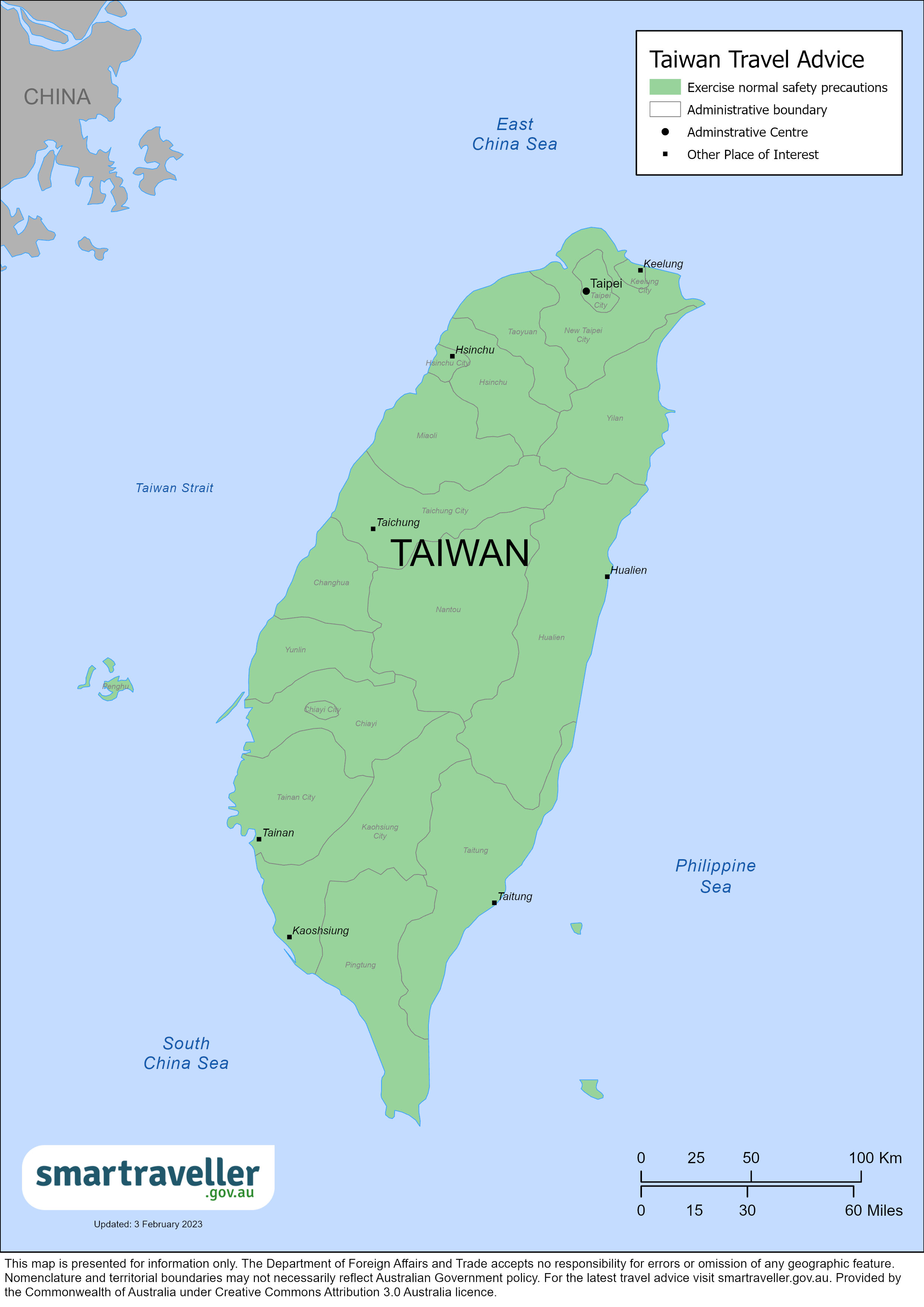
Taiwan (PDF 184.99 KB)
Asia (PDF 2.21 MB)
Local emergency contacts
English language emergency line.
Call 0800 024 111.
Medical emergencies
Call 110 or contact the nearest police station.
Advice levels
Exercise normal safety precautions in Taiwan.
- A 7.4 magnitude earthquake occurred off the coast of Taiwan on 3 April. There's damage to buildings and infrastructure, with disruptions to local transport. Avoid affected areas and follow the advice of local authorities.
- Crime rates are low, including for petty crime. Taxi drivers have sometimes assaulted passengers. However, taxis are usually safe. Use radio taxis or arrange taxis online or through your hotel.
- Extortion scams occur. These include minor car accidents and claims of sexual assault at nightclubs. Report suspicious behaviour.
- Protests happen sometimes. They're usually peaceful but can turn violent. Avoid large public gatherings.
- The typhoon season is from May to November. Flooding and mudslides are common. Businesses and government offices close on 'typhoon days'. Follow local advice to prepare for a disaster. Updates on typhoons and other severe weather are available from the Taiwan Central Weather Administration .
- Earthquakes happen often and may disrupt train services. Confirm travel arrangements before travelling. Get advice on being in an earthquake-prone region. Tsunamis also happen. Know the tsunami warning signs and move to high ground straight away. Don't wait for official alerts.
Full travel advice: Safety
- Some prescription medications are illegal in Taiwan. Authorities may jail or fine you if you have them. Before you travel, check Taiwan Customs for limits and documents you'll need.
- Insect-borne diseases such as Dengue, Zika and Japanese encephalitis occur. Ensure your accommodation is insect-proof. Get vaccinated if vaccines are available. If you’re pregnant, discuss your travel plans with your doctor before you travel.
- Waterborne, foodborne and other infectious diseases, such as hand, foot and mouth disease, are common. Drink only boiled or bottled water. Avoid ice cubes. Wash your hands thoroughly and often.
- The standard of public hospitals in major cities is good. Wait times are often long. Some hospitals have English-speaking private clinics, but these can be expensive. You may have to pay up-front, even for emergency care. Ensure your travel insurance covers all medical costs.
Full travel advice: Health
- Don't use or carry illegal drugs, including illegal prescription medication. Penalties for drug offences are severe. They include the death penalty, life in prison, long jail terms and heavy fines.
- Taiwan recognises dual nationality. Taiwanese males older than 18 years must do military service. Some exemptions are available to overseas residents. If you're not exempt, you may have to serve when you arrive. Check Taiwan's Department of Conscription Administration for details. Consular services may be limited for dual nationals who do not enter Taiwan on their Australian passport.
Full travel advice: Local laws
- Taiwan has a visa-exempt entry scheme for nationals of designated countries, including Australia. Refer to Taiwan's Bureau of Consular Affairs website for requirements and restrictions. Entry and exit conditions can change at short notice. You should contact the nearest Taiwan representative office for the latest details.
- If you intend to engage in certain activities in Taiwan, for example, religious work, you'll need to obtain an approval/entry permit or visa. Contact your nearest Taiwan representative office for entry applications. See T aiwan's Bureau of Consular Affairs for further information.
- You'll be screened for high body temperature when you arrive in Taiwan. This is to guard against pandemics such as COVID-19 , SARS and bird flu ( avian influenza ). Depending on your results, you may need more medical tests.
Full travel advice: Travel
Local contacts
- The Consular Services Charter details what we can and can't do to help you overseas.
- For consular help, contact the Australian Office in Taipei .
- To stay up to date with local information, follow the Office's social media accounts.
Full travel advice: Local contacts
Full advice
Civil unrest and political tension.
Demonstrations happen sometimes but are usually peaceful.
Public protests and events that draw large groups of people can turn violent.
To protect yourself during periods of unrest:
- monitor local media for planned or possible action
- avoid rallies and protests
- follow the advice of local authorities
More information:
- Demonstrations and civil unrest
Crime rates are low, including for petty crime.
Taxi drivers have assaulted some passengers. However, taxis are usually safe.
Some Australians have become victims of extortion scams . Examples include minor car accidents and claims of sexual assault at nightclubs.
To keep yourself safe:
- take care of your belongings, especially in crowded places
- report suspicious behaviour
- use radio taxis, or taxis booked on the internet or through your hotel
Card skimming occurs. Keep an eye on your card when making purchases.
Cyber security
You may be at risk of cyber-based threats during overseas travel to any country. Digital identity theft is a growing concern. Your devices and personal data can be compromised, especially if you’re connecting to Wi-Fi, using or connecting to shared or public computers, or to Bluetooth.
Social media can also be risky in destinations where there are social or political tensions, or laws that may seem unreasonable by Australian standards. Travellers have been arrested for things they have said on social media. Don't comment on local or political events on your social media.
Cyber security when travelling overseas
Kidnapping can happen anywhere, anytime, including in destinations that are typically at lower risk. The Australian Government's longstanding policy is that it doesn't make payments or concessions to kidnappers.
More information:
- Kidnapping
Terrorism is a threat worldwide.
- Terrorist threats
Climate and natural disasters
Taiwan experiences natural disasters and severe weather , including:
- earthquakes
Typhoons happen in the wet or typhoon season from May to November. Flooding and mudslides are common.
The direction and strength of typhoons can change with little warning. In some areas, shelter from a severe typhoon may not be available to everyone.
If a typhoon is approaching, be aware that:
- flights in and out of affected areas could be delayed or suspended
- available flights may fill quickly
- access to ports could be affected
If a typhoon is approaching, local authorities may declare a 'typhoon day' at very short notice. This means businesses may only open for a short time and government offices may close.
The Australian Office in Taipei may close on typhoon days. See Local contacts .
Authorities announce a 'typhoon day' on local radio and television stations. This includes International Community Radio Taipei (ICRT) , which broadcasts in English.
Updates on typhoons and other severe weather are available from the Taiwan Central Weather Administration . You can also keep up to date by checking:
- World Meteorological Organisation Severe Weather Information Centre
- Joint Typhoon Warning Centre
- Global Disaster Alert and Coordination System
To prepare yourself in case of a typhoon:
- know your hotel's or cruise ship's evacuation plans
- secure your passport in a safe, waterproof location
- take official warnings seriously
- follow the advice of local authorities on preparing for a natural disaster
If there's a typhoon or other natural disaster approaching:
- tune your radio to FM100.7 for English-language updates
- monitor the media, other local information sources and the Global Disaster Alert and Coordination System
- stay in touch with friends and family
- contact your airline for the latest flight information
- contact a tour operator to check if services at your planned destinations have been affected
Earthquakes and tsunamis
A 7.4 magnitude earthquake occurred off the coast of Taiwan on 3 April. There's damage to buildings and infrastructure, with disruptions to local transport. Avoid affected areas and follow the advice of local authorities.
Earthquakes often occur and may disrupt train services. Confirm travel arrangements before travelling. Get advice on travelling to and living in an earthquake-prone region.
Tsunamis are a risk because of frequent earthquakes in the region.
For more information check out:
- Taiwan’s Central Weather Administration’s Seismological Center
- Taiwan's Emergency Management Information Center 全民防災e點通 (emic.gov.tw) APP for the latest information.
- the US Tsunami Warning Center for information on earthquakes and tsunamis.
If you're near the coast, move immediately to high ground if advised by local authorities or if you:
- feel a strong earthquake that makes it hard to stand up
- feel a weak, rolling earthquake that lasts a minute or more
- see a sudden rise or fall in sea level
- hear loud and unusual noises from the sea
Don't wait for official warnings, such as alarms or sirens. Once on high ground, check local media.
Travel insurance
Get comprehensive travel insurance before you leave.
Your policy needs to cover all overseas medical costs, including medical evacuation. The Australian Government won't pay for these costs.
If you can't afford travel insurance, you can't afford to travel. This applies to everyone, no matter how healthy and fit you are.
If you're not insured, you may have to pay many thousands of dollars up-front for medical care.
- what activities and care your policy covers
- that your insurance covers you for the whole time you'll be away
Physical and mental health
Consider your physical and mental health before you travel, especially if you have an existing medical condition.
See your doctor or travel clinic to:
- have a basic health check-up
- ask if your travel plans may affect your health
- plan any vaccinations you need
Do this at least 8 weeks before you leave.
If you have immediate concerns for your welfare or the welfare of another Australian, call the 24-hour Consular Emergency Centre on +61 2 6261 3305 or contact your nearest Australian Embassy, High Commission or Consulate to discuss counselling hotlines and services available in your location.
- General health advice
- Healthy holiday tips (Healthdirect Australia)
Medications
Not all medication available over the counter or by prescription in Australia is available in other countries. Some may even be considered illegal or a controlled substance, even if prescribed by an Australian doctor.
Some prescription medications are illegal in Taiwan. Authorities may jail or fine you for carrying these medications.
If you plan to take medication, check if it's legal in Taiwan. Take enough legal medicine with you for your trip.
Taiwan Customs gives advice on limits and documents you'll need.
Carry a copy of your prescription or a letter from your doctor stating:
- what the medication is
- your required dosage
- that it's for personal use
Health risks
Insect-borne diseases.
Dengue occurs, especially in the tropical southern and central regions.
Cases of Zika virus were reported in 2016. There's no vaccine available against dengue or Zika virus.
You could also encounter Japanese encephalitis in Taiwan.
To protect yourself from disease:
- make sure your accommodation is insect-proof
- use insect repellent
- wear long, loose, light-coloured clothing
Speak with your doctor about getting vaccinated against Japanese encephalitis before you travel.
If you're pregnant, ask your doctor about possible Zika virus risks.
Other health risks
Hand, foot and mouth disease (HFMD) is common. Sometimes serious outbreaks occur. Outbreaks usually start in March or April and peak in May. However, they can continue until October each year.
HFMD mostly affects children aged under 10 years. However, adult cases occur, especially in young adults.
HFMD spreads through contact with discharges of infected people.
Waterborne, foodborne and other infectious diseases are common. Sometimes serious outbreaks occur.
To protect yourself from illness:
- practice good hygiene, including careful and frequent handwashing
- drink boiled water or bottled water with sealed lids
- avoid ice cubes
Get medical advice if you have a fever or diarrhoea.
If you test positive for COVID-19 you're still advised to follow the Self-Health Management protocols. See Epidemic Prevention Measures for details.
- Infectious diseases
Medical care
Medical facilities.
The standard of medical facilities in public hospitals in major cities is good. However, there are often long waiting times.
The medical system can be confusing. Some hospitals have English-speaking private clinics.
Treatment at private clinics and priority care centres is expensive. You may have to pay up-front for medical and dental services, including for emergency care.
You're subject to all local laws and penalties, including those that may appear harsh by Australian standards. Research local laws before travelling.
If you're arrested or jailed, the Australian Government will do what it can to help you under our Consular Services Charter . But we can't get you out of trouble or out of jail.
Penalties for drug offences are severe and include life imprisonment and the death penalty.
Carrying certain prescription drugs can result in heavy fines and long jail sentences. See Health .
- Carrying or using drugs
If you're involved in a legal dispute, you won't be allowed to leave Taiwan until the dispute is settled. This includes minor offences.
You may be detained on arrival if you have an outstanding arrest warrant in Taiwan.
Legal processes can be long. Local authorities won't accept bonds or deposits to guarantee court appearances.
Australian laws
Some Australian criminal laws still apply when you're overseas. If you break these laws, you may face prosecution in Australia.
- Staying within the law and respecting customs
Dual citizenship
Taiwan recognises dual nationality. Taiwanese males aged over 18 must do military service. Some exemptions are available to overseas residents, but you should check this before travelling. If you're not exempt, you may have to serve when you arrive.
If you're a Taiwanese-Australian dual national and you're male, check before you travel.
- Taipei Economic and Cultural Office
- National Conscription Agency
- Dual nationals
Visas and border measures
Every country or territory decides who can enter or leave through its borders. For specific information about the evidence you'll need to enter a foreign destination, check with the nearest embassy, consulate or immigration department of the destination you're entering.
Taiwan has restored the visa-exempt entry scheme for nationals of designated countries, including Australia. Please see T aiwan's Bureau of Consular Affairs website for the visa-exempt entry requirements and restrictions.
You won't need a visa for Taiwan if you meet all these conditions:
- you'll only stay for up to 90 days
- you're visiting for tourism or business
- you have a confirmed return or onward air ticket
- your passport is valid for at least 6 months from the date of your entry
- you're not travelling on an emergency passport
In other situations, you'll need to get a visa before you travel.
Australians can use Taiwan's e-Gate service. To register for e-Gate, visit the e-Gate Enrolment Counters at the airport, located next to the e-Gate lanes at passport control. The registration is valid until 6 months before your passport's expiry date, until you renew your passport, or until you obtain an Alien Resident Card (ARC) in Taiwan. You'll need then to register each trip online to use the gates. More information is available at the e-Gate Enrolment System website.
Working holiday-makers (WHM) must apply for the WHM visa before arriving. WHM visas are also valid as a work permit.
Entry and exit conditions can change. Contact the Taipei Economic and Cultural Office (TECO) for details about visas, currency, customs and quarantine rules.
- National Immigration Agency
Border measures
International transits are permitted at Taiwan's airports. Refer to Taoyuan International Airport or contact your airline or travel agent for more information on transiting Taiwan.
You'll be screened for high body temperature when you arrive. This is to guard against pandemics such as COVID-19 , SARS and bird flu ( avian influenza ). Depending on your results, you may need more medical tests.
Other formalities
If you plan to take prescription or non-prescription medicines with you, check the Taiwan Customs website before you travel. See Health .
If you're planning to work, you need to get a work permit before you start paid or unpaid work. Work permits are usually arranged in Taiwan through your employer.
If you work without a work permit or WHM visa, authorities could fine or deport you.
- Taiwan Workforce Development Agency
- Taiwan Bureau of Consular Affairs
Some countries won't let you enter unless your passport is valid for 6 months after you plan to leave that country. This can apply even if you're just transiting or stopping over.
Some foreign governments and airlines apply the rule inconsistently. Travellers can receive conflicting advice from different sources.
You can end up stranded if your passport is not valid for more than 6 months.
The Australian Government does not set these rules. Check your passport's expiry date before you travel. If you're not sure it'll be valid for long enough, consider getting a new passport .
Lost or stolen passport
Your passport is a valuable document. It's attractive to people who may try to use your identity to commit crimes.
Some people may try to trick you into giving them your passport. Always keep it in a safe place.
If your passport is lost or stolen, tell the Australian Government as soon as possible:
- In Australia, contact the Australian Passport Information Service .
- If you're overseas, contact the nearest Australian embassy or consulate .
Passport with ‘X’ gender identifier
Although Australian passports comply with international standards for sex and gender, we can’t guarantee that a passport showing 'X' in the sex field will be accepted for entry or transit by another country. Contact the nearest embassy, high commission or consulate of your destination before you arrive at the border to confirm if authorities will accept passports with 'X' gender markers.
LGBTI travellers
The local currency is the New Taiwan Dollar (NTD).
Declare amounts over USD10,000 or equivalent.
ATMs are widely available in cities and provincial centres.
International credit cards are usually accepted in hotels, restaurants and higher-end shops, especially in cities and larger towns.
Local travel
Local restrictions.
You're no longer required to wear a mask outdoors. However, you must wear a face mask in some public venues, including:
- healthcare facilities
Driving permit
If you plan to drive in Taiwan, you must get an International Driving Permit (IDP) before you arrive.
You can drive for up to 30 days with an IDP and a current Australian licence.
If you plan to stay longer, apply for an extension at the nearest motor vehicle office in Taiwan.
Check Taiwan’s Highway Bureau for information on how to apply for a Taiwanese Driver's Licence.
Road travel
Roads and vehicles are well-maintained but scooters and motorcycles often weave in and out of traffic, and vehicles might not stop at pedestrian crossings. Look before stepping onto the road.
Heavy rain and typhoons can lead to landslides and road blockages.
Mountain roads are usually winding and narrow. Travellers have been injured in bus accidents on these roads.
To stay safe:
- don't expect traffic to stop at pedestrian crossings — look before stepping onto the road
- assess weather and road conditions before you drive, especially during typhoon season
- take particular care when driving on mountain roads
- Driving or riding
Motorcycles
You need a motorcycle licence, either Taiwanese or international, to hire a motorbike.
Check if your travel insurance policy covers you when riding a motorbike.
Always wear a helmet.
Taxis are usually safe. However, there have been instances of drivers assaulting passengers.
To minimise risk, use:
- radio taxis
- taxis booked on the internet
- taxis booked through your hotel
Mountain Hiking
Permits may be required for entering mountains in Taiwan. Ensure the phone location mode (GPS) on the mobile device is turned on. If you get lost in the mountains, dial 119 and follow the instructions to send your location. Alternatively, you can report the location number shown on a blue plate of the nearest electricity pole.
Public transport
Taiwan has well-developed rail and bus services.
Petty crime happens, so take care of your belongings.
- Transport and getting around safely
Some cruise lines stopover in Taiwan.
- Going on a cruise
DFAT doesn't provide information on the safety of individual commercial airlines or flight paths.
Check Taiwan's air safety profile with the Aviation Safety Network.
Emergencies
Depending on what you need, contact your:
- family and friends
- travel agent
- insurance provider
Medical emergencies (including mountain rescues)
Always get a police report when you report a crime.
Your insurer may have a 24-hour emergency number.
Information for Foreigners
Consular contacts.
Read the Consular Services Charter for what the Australian Government can and can't do to help you overseas.
For consular help, contact the Australian Office in Taipei.
The Australian Office, Taipei
27th and 28th Floor, President International Tower 9-11 Song Gao Road Taipei, 110 Phone: (+886 2) 8725 4100 Fax: (+886 2) 8789 9599 Website: australia.org.tw Email: [email protected] Facebook: facebook.com/australianofficetaipei X: twitter.com/AusOfficeTPE
Check the Australian Office in Taipei website for details about opening hours and any temporary closures.
24-hour Consular Emergency Centre
In a consular emergency, if you can't contact the Australian Office, call the 24-hour Consular Emergency Centre on:
- +61 2 6261 3305 from overseas
- 1300 555 135 in Australia

Travelling to Taiwan?
Sign up to get the latest travel advice updates..
Be the first to know official government advice when travelling.
China Should Have Confidence to Talk to Us, Taiwan's President-Elect Says
China Should Have Confidence to Talk to Us, Taiwan's President-Elect Says

Taiwan President-elect Lai Ching-te speaks waves during a press conference where incoming cabinet members are announced, in Taipei, Taiwan April 25, 2024. REUTERS/Carlos Garcia Rawlins
By Yimou Lee and Ben Blanchard
TAIPEI (Reuters) -China should have the confidence to talk to Taiwan's legally elected government, President-elect Lai Ching-te said on Thursday as he appointed his new national security and diplomacy team amid what he called unprecedented challenges.
China, which views democratically governed Taiwan as its own territory, over the island's strong objections, has ramped up military and political pressure against Taipei during the past four years as it seeks to press sovereignty claims.
Lai, who takes office on May 20, is particularly disliked by Beijing, which views him as a dangerous separatist. Lai has repeatedly offered to talk with China has but been rebuffed.
The challenge the new national security team is facing is unprecedented, given the rise of authoritarianism, and China pressing closer all the time, Lai told reporters as he announced the teams, staffed by people in the current administration.
He also again offered to talk to Beijing.
Photos You Should See - April 2024

"I am very much looking forward to China having the confidence to engage with the elected and legitimate government that the Taiwan people have entrusted. That is the right way for cross-strait exchange," he said.
Lai said Beijing would not get support from the Taiwanese public if they are only willing to engage Taiwan's opposition with "political preconditions", in a veiled reference to the opposition Kuomintang (KMT) party, whose senior leaders have made frequent visits to China in recent months.
China's Taiwan Affairs Office referred Reuters to comments it made on Jan. 17 after Lai won the election in which it said Lai did not represent mainstream public opinion, given he did not win a majority of all the votes cast, and that the result did not change the fact Taiwan is part of China.
Beijing has repeatedly said any talks can only take place if Taiwan's government accepts that both sides of the Taiwan Strait are part of "one China", which is supported by the KMT but rejected by Lai and President Tsai Ing-wen.
National Security Council Secretary-General Wellington Koo, a lawyer by training, will take over as defence minister from Chiu Kuo-cheng, a former army commander, Lai said.
Koo said he was determined to discourage any Chinese adventurism over Taiwan with "coordinated actions" with allies in the region and show the world Taiwan's determination to defend itself by strengthening its combat capabilities.
"Our top aim is to complicate the other side of the strait's calculations to make a timetable for possible rash actions," he said, standing on stage with Lai and other incoming ministers.
Koo is being succeeded as head of the National Security Council by current Foreign Minister Joseph Wu, while Lin Chia-lung, the serving secretary-general at the Presidential Office, will become the new foreign minister, Lai said.
The post of the head of the top China policy maker, the Mainland Affairs Council has gone to Chiu Chui-cheng, a former deputy on the council with years of China policy experience.
Intelligence chief Tsai Ming-yen stays on as head of the National Security Bureau.
(Reporting by Yimou Lee and Ben Blanchard; Additional reporting by Ryan Woo in Beijing; Editing by Gerry Doyle, Miral Fahmy and Ros Russell)
Copyright 2024 Thomson Reuters .
Join the Conversation
Tags: United States , Taiwan , Asia
America 2024

Health News Bulletin
Stay informed on the latest news on health and COVID-19 from the editors at U.S. News & World Report.
Sign in to manage your newsletters »
Sign up to receive the latest updates from U.S News & World Report and our trusted partners and sponsors. By clicking submit, you are agreeing to our Terms and Conditions & Privacy Policy .
You May Also Like
The 10 worst presidents.
U.S. News Staff Feb. 23, 2024

Cartoons on President Donald Trump
Feb. 1, 2017, at 1:24 p.m.

Photos: Obama Behind the Scenes
April 8, 2022

Photos: Who Supports Joe Biden?
March 11, 2020

What to Know: Bird Flu Virus in Milk
Cecelia Smith-Schoenwalder April 26, 2024

Inflation a Stubborn Foe for the Fed
Tim Smart April 26, 2024

The Curse of the Modern Vice President

‘A Rule for the Ages’
Lauren Camera April 25, 2024

Sale? Ban? What’s Next for TikTok?
Laura Mannweiler April 25, 2024

The Status of the Cases Against Trump
Lauren Camera and Kaia Hubbard April 25, 2024

- Election 2024
- Entertainment
- Newsletters
- Photography
- Personal Finance
- AP Investigations
- AP Buyline Personal Finance
- AP Buyline Shopping
- Press Releases
- Israel-Hamas War
- Russia-Ukraine War
- Global elections
- Asia Pacific
- Latin America
- Middle East
- Election Results
- Delegate Tracker
- AP & Elections
- Auto Racing
- 2024 Paris Olympic Games
- Movie reviews
- Book reviews
- Personal finance
- Financial Markets
- Business Highlights
- Financial wellness
- Artificial Intelligence
- Social Media
Taiwan’s president-elect appoints new foreign, defense ministers as island faces continued threats
In this photo released by the Taiwan Presidential Office, U.S. Democratic Congressman Dan Kildee, left, meets with Taiwan President-elect and Vice President Lai Ching-te in Taipei, Taiwan on Tuesday, April 23, 2024. Kildee and Lisa McClain, secretary-general of the Republican Caucus of the U.S. House of Representatives jointly led a cross-party group of lawmakers to visit Taiwan from April 23 to 25 . Members also include Mark Alford, a member of the House Armed Services Committee. (Taiwan Presidential Office via AP)
In this photo released by the Taiwan Presidential Office, Lisa McClain, left, secretary-general of the Republican Caucus of the U.S. House of Representatives meets with Taiwan President-elect and Vice President Lai Ching-te in Taipei, Taiwan on Tuesday, April 23, 2024. McClain and Democratic Congressman Dan Kildee jointly led a cross-party group of lawmakers to visit Taiwan from April 23 to 25 . Members also include Mark Alford, a member of the House Armed Services Committee. (Taiwan Presidential Office via AP)
- Copy Link copied
TAIPEI, Taiwan (AP) — Taiwan’s president-elect has appointed new foreign and defense ministers to join his incoming administration as the island faces continuing military threats and diplomatic isolation from China.
Lai Ching-te, who assumes the presidency on May 20, announced Thursday that current Presidential Secretary General Lin Chia-lung will take over as foreign minister.
He said Wellington Koo will head the Defense Ministry at a time when Taiwan is upgrading its defenses against China with new ships, submarines, warplanes, missile systems and other land-based defenses.
Along with stepping up its threat to annex Taiwan by force, China has whittled down the number of Taiwan’s formal diplomatic allies to just 12, while excluding it from the United Nations and most other international organizations.
Koo, a lawyer, has headed the National Security Council under current President Tsai Ing-wen, who is leaving office as mandated after two four-year terms. He will be replaced in the high-profile role by current Foreign Minister Joseph Wu.
Taiwan has a long-embedded tradition of civilians serving as defense minister, in contrast to China’s practice of appointing top generals who have taken an increasingly bellicose attitude toward Taiwan, the U.S. and in asserting China’s territorial claims in the South China and East China seas.
Lin previously served as mayor of Taiwan’s largest city, Taichung, and was put in charge of Taiwan’s economic outreach to Southeast Asia, Australia and New Zealand. Both Lin and Koo are members of the Democratic Progressive Party, with which China has cut contacts over its refusal to acknowledge Beijing’s claim of sovereignty over the island.
Lai handily won the presidential election in January, although the main opposition Nationalist Party that backs eventual unification with China took a one-vote majority in the legislature.
Taiwan has a mixture of presidential and parliamentary systems with much power also invested in local city and county governments. The formula emerged after Chiang Kai-shek’s Nationalists relocated their government to the former Japanese colony of Taiwan in 1949 as Mao Zedong’s Communists seized power on the mainland after a decades-long civil war.
Taiwan's president-elect appoints new foreign, defense ministers as island faces continued threats
Taiwan’s president-elect has appointed new foreign and defense ministers to join his incoming administration as the island faces continuing military threats and diplomatic isolation from China
TAIPEI, Taiwan -- Taiwan's president-elect has appointed new foreign and defense ministers to join his incoming administration as the island faces continuing military threats and diplomatic isolation from China .
Lai Ching-te, who assumes the presidency on May 20, announced Thursday that current Presidential Secretary General Lin Chia-lung will take over as foreign minister.
He said Wellington Koo will head the Defense Ministry at a time when Taiwan is upgrading its defenses against China with new ships, submarines, warplanes, missile systems and other land-based defenses.
Along with stepping up its threat to annex Taiwan by force, China has whittled down the number of Taiwan’s formal diplomatic allies to just 12, while excluding it from the United Nations and most other international organizations.
Koo, a lawyer, has headed the National Security Council under current President Tsai Ing-wen, who is leaving office as mandated after two four-year terms. He will be replaced in the high-profile role by current Foreign Minister Joseph Wu.
Taiwan has a long-embedded tradition of civilians serving as defense minister, in contrast to China's practice of appointing top generals who have taken an increasingly bellicose attitude toward Taiwan, the U.S. and in asserting China's territorial claims in the South China and East China seas.
Lin previously served as mayor of Taiwan's largest city, Taichung, and was put in charge of Taiwan's economic outreach to Southeast Asia, Australia and New Zealand. Both Lin and Koo are members of the Democratic Progressive Party, with which China has cut contacts over its refusal to acknowledge Beijing's claim of sovereignty over the island.
Lai handily won the presidential election in January, although the main opposition Nationalist Party that backs eventual unification with China took a one-vote majority in the legislature.
Taiwan has a mixture of presidential and parliamentary systems with much power also invested in local city and county governments. The formula emerged after Chiang Kai-shek's Nationalists relocated their government to the former Japanese colony of Taiwan in 1949 as Mao Zedong's Communists seized power on the mainland after a decades-long civil war.
Top Stories

Trump trial updates: Pecker reaffirms catch-and-kill was to benefit Trump
- 21 minutes ago

High school athletic director used AI to create fake racist rant of principal: Police
- Apr 25, 6:31 PM

Ex-official told investigators Trump had 'no standing declassification order'
- Apr 25, 6:55 PM

Airlines required to refund passengers for canceled, delayed flights
- Apr 24, 11:06 AM

Walmart US CEO talks inflation, self-checkout, and non-college degree workers
- Apr 25, 7:51 PM
Mainland to expand use of travel permits for Taiwan residents
The Chinese mainland will further facilitate the use of mainland travel permits for Taiwan residents, a State Council Taiwan Affairs Office spokesperson said Wednesday.
Spokesperson Zhu Fenglian said at a regular press conference that Fujian Province had provided convenience for Taiwan compatriots holding travel permits regarding travel, finance, telecommunications and other areas.
This is the outcome of a series of entry-exit policies that came into effect on January 1, 2024, aimed at boosting personnel exchanges between Fujian and Taiwan and facilitating the daily lives of Taiwan compatriots in Fujian.
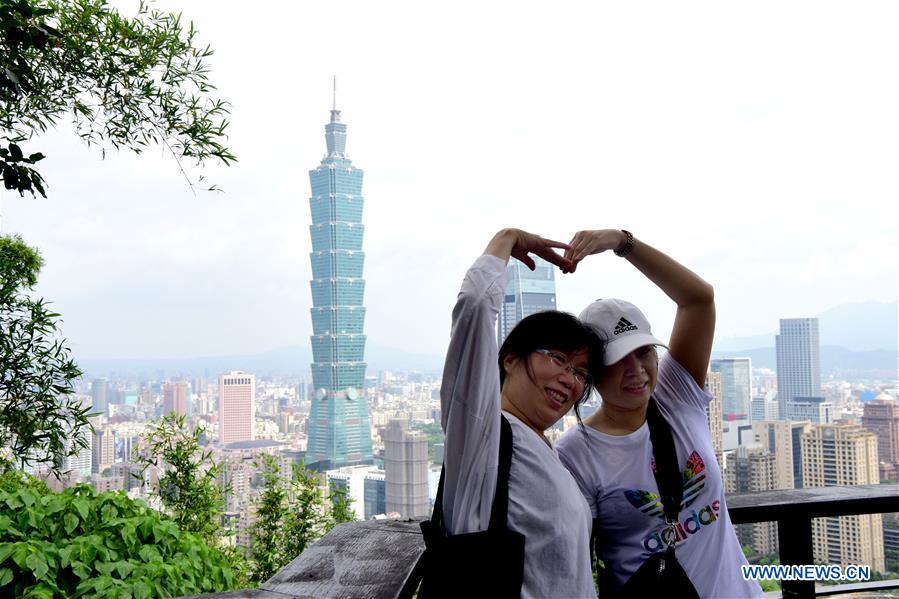
Tourists pose for a photo on Xiangshan Mountain in Taipei, southeast China's Taiwan, July 21, 2019. /Xinhua
Since the beginning of this year, about 90,000 five-year travel permits and 11,000 single-entry travel permits have been issued by authorities in Fujian to Taiwan compatriots, an increase of 56.4 percent and 200 percent, respectively, from the same period last year, Zhu said.
During this period, ports of entry and exit in Fujian have witnessed 230,000 inbound trips made by Taiwan compatriots, an increase of 260 percent year on year, she added.
Fujian has set up special entry-exit service counters for individuals and businesses from Taiwan regarding document application, settlement procedures, and policy inquiries, Zhu said.
The "12367" immigration service hotline also offers service in the Minnan dialect, which is widely spoken in Fujian and Taiwan, to offer convenience to Taiwan compatriots, according to Zhu.
- Learn Chinese
EXPLORE MORE
DOWNLOAD OUR APP
Copyright © 2024 CGTN. 京ICP备20000184号

Disinformation report hotline: 010-85061466
- Terms of use
- Privacy policy
Taiwan says new Chinese air routes threaten Taiwanese islands' flight safety
- Medium Text
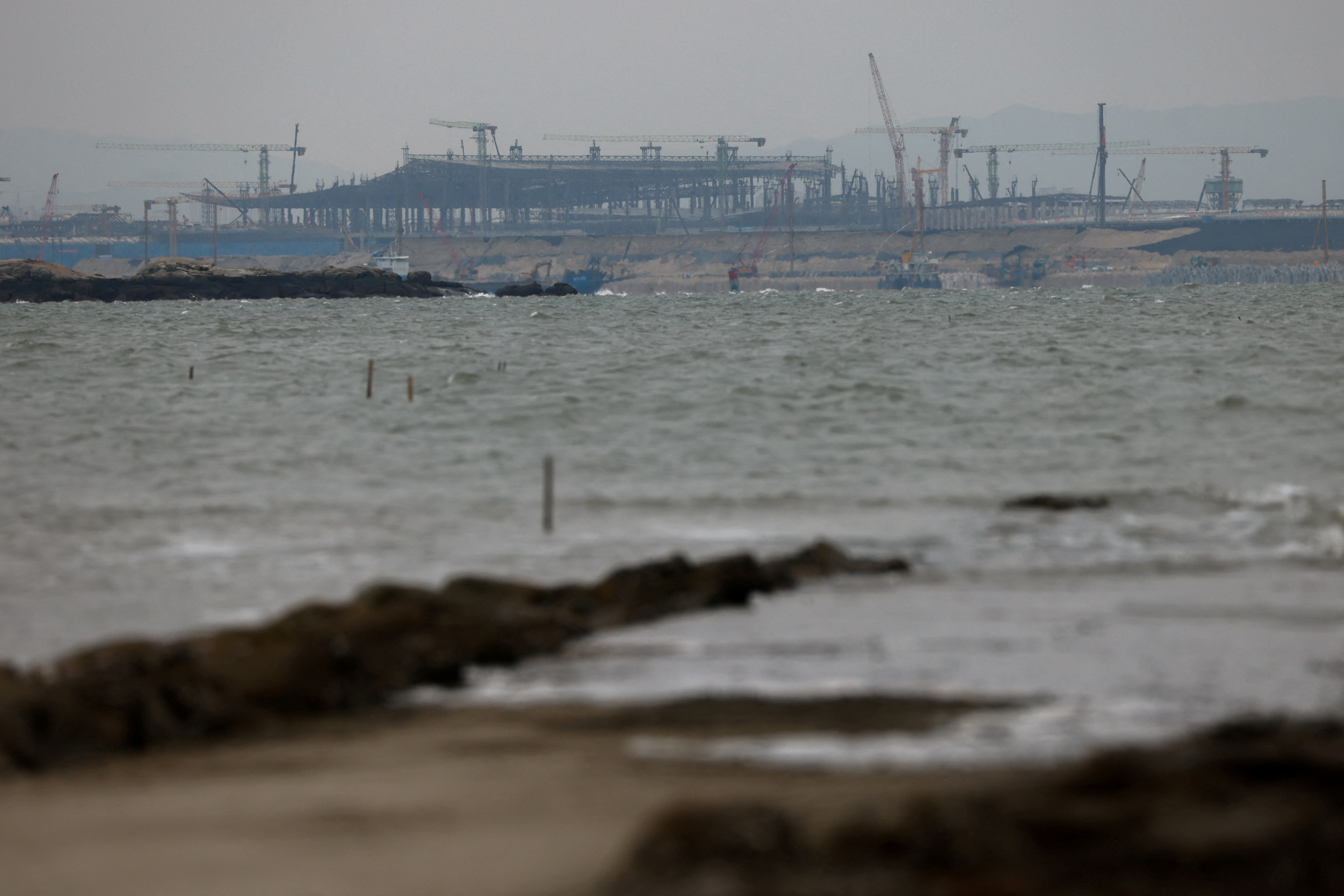
- China opens new air routes running close to Taiwanese islands
- Taiwan decries move as flight safety risk
- Routes are near Taiwan-controlled Kinmen and Matsu islands
- China says flight paths to improve flight operations

CONTROLLED AIR SPACE
Sign up here.
Reporting by Ben Blanchard and Ryan Woo; Additional reporting by Yimou Lee in Taipei; Graphic by Jackie Gu; Editing by Christopher Cushing, Jamie Freed and Angus MacSwan
Our Standards: The Thomson Reuters Trust Principles. New Tab , opens new tab
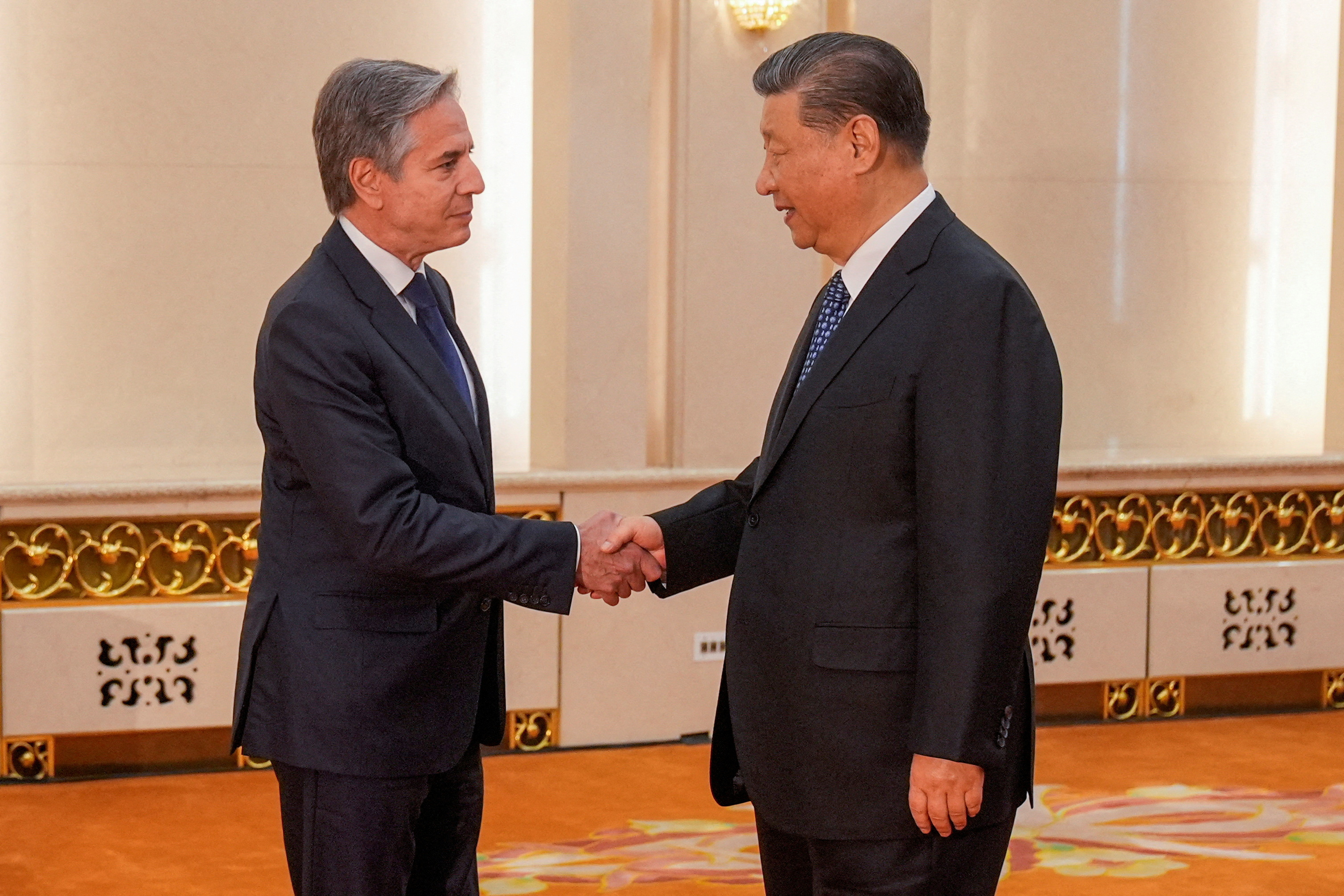
World Chevron
At least two expatriate workers were killed and two other people wounded after a drone attack targeted the Khor Mor gas field in Iraq's Kurdistan region on Friday, an advisor to the Iraqi Kurdish Prime Minister and a senior Kurdish political source told Reuters.
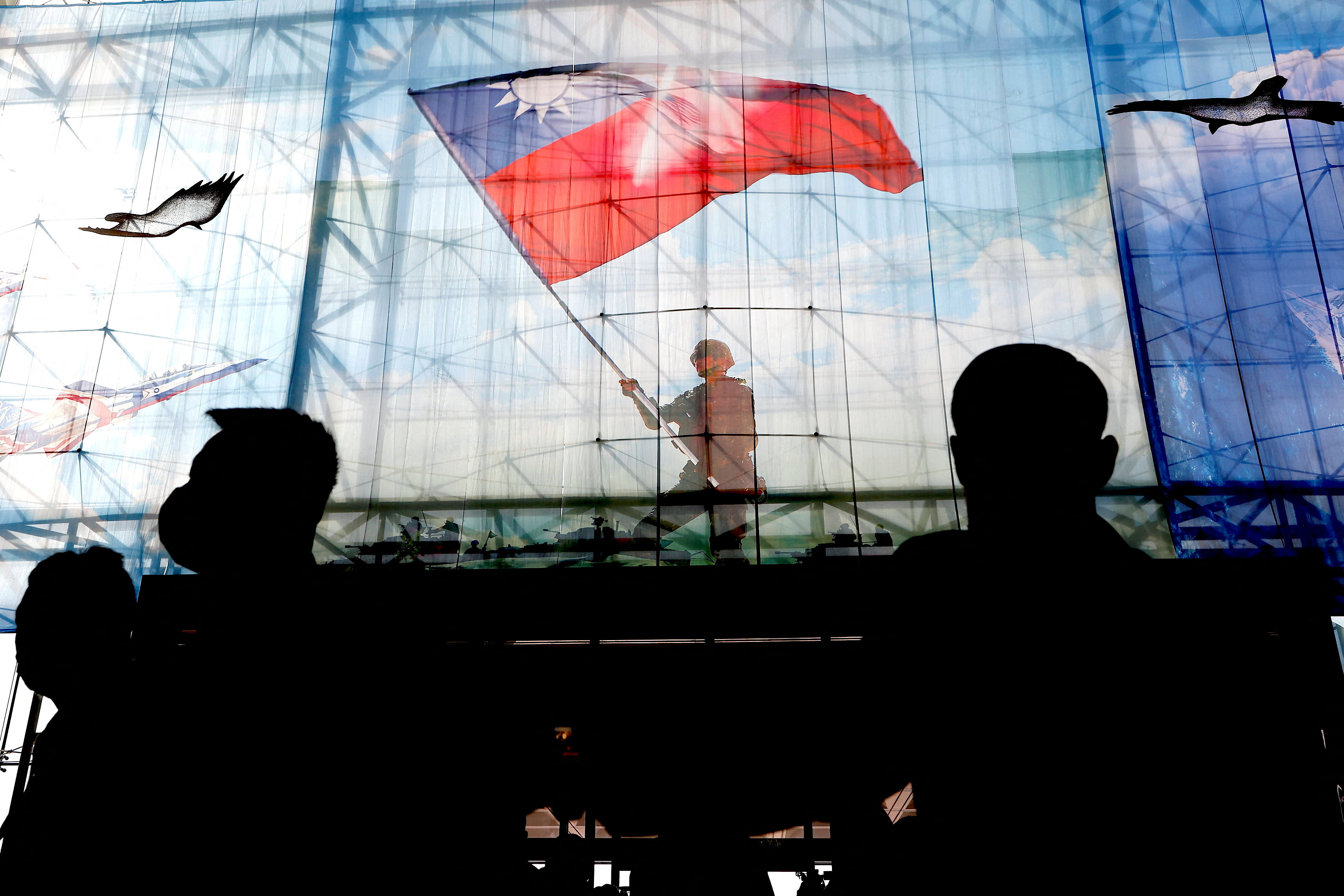
- Share full article
Advertisement
Supported by
Modern Love
When Love Means Being Selfish
I knew I had to hold onto what I needed — even if that meant using a lawyer to get custody (of a dog).

By Frederick Reimers
“You cannot use my dog to attract other girls,” my ex emailed from Taiwan. She could see on social media that I had been on a ski tour with a woman, and there were photos of the dog, Bhoga, bounding downhill in the broken snow of our ski tracks.
Not that I believed she had a say in how Bhoga and I spent our time. A year earlier, she had moved from Portland, Ore., to Taiwan to teach English, a mercy killing for our on-again-off-again relationship. There had never been enough trust between us. She had disturbing dreams of me tattooing strange things onto her body. What I really did to her was withhold love.
When we first got together, a snowstorm shut down the city. She skipped work and we skied through the streets. I later fell for her when she played cello in a bathrobe. But a year later, she would sometimes disappear for a whole weekend and call me for a ride home Sunday night.
My ex had brought Bhoga into our relationship as a little puppy. Eighteen months later, when she planned to leave the country, we agreed the dog would stay with me because Taiwan required a six-week quarantine for arriving dogs. It was unbearable for me to think of this sensitive pup, who trembled with fear when city buses trundled by, being confined in a concrete kennel for that long.
Bhoga was an unlikely lure for a new love. “She’s kind of homely,” my mother said when I brought her to Wyoming for a visit. Her adoption papers said German shepherd mixed with boxer, a common pet shelter euphemism for pit bull. She had a wasp waist and barrel chest with a rough brown-and-black brindled coat. The stripes made her brow appeared furrowed, and with her black muzzle and flattened ears, she could look murderous. People gave us a wide berth on walks. Even the name my ex gave her was ungainly sounding, a Sanskrit word for enjoyment, or indulgence.
Up close, though, Bhoga’s yellow eyes conveyed love. She was exceptional in ways I admired — polite, athletic and confident (except in the case of city buses). On the river, she would sit placidly on the nose of a paddleboard as we bobbed through white water.
As someone who had been bullied as a child, I loved her grit: She never started a fight but never lost one either. If she wanted something — to go outside, a scratch behind the ears — she would quietly tap her toenails on the wooden floor until you noticed.
With friends, she swerved from outstretched hands but later invited affection. Her attention felt bestowed, which was a revelation to me. I had been sent away to boarding school at age 11, and in college my first real love had dumped me hard.
Those betrayals stuck with me, and I struggled to trust relationships. This confident animal behaved as if there were no person she would rather be with, no errand she didn’t want to join. So of course I would bring her on dates, to prove to the women I was interested in, and to myself, that I was worthy and capable of love.
Bhoga and I went skiing with more than one prospective girlfriend. There was the camping trip where a woman and I awoke at dawn to an animal snuffling and pushing against the tent’s nylon walls. Terrified it was a bear, we laughed in relief when we saw it was Bhoga, having slipped out in the night and now pawing to get back in.
She and I had grown so inseparable that when my ex returned to Portland after two years, I couldn’t contemplate parting with her. By then I’d been caring for Bhoga almost her entire life, and she was more important to me than any other living being.
When my ex demanded that I return Bhoga, and then called the cops on me when I didn’t respond, I panicked and fled to my parents’ house in Wyoming. Then I got a lawyer. It was a terrible thing to do, my most selfish act ever, but also the most empowering.
The lawyer asked if I wanted to consider a shared custody agreement, but I didn’t trust that; I couldn’t imagine my ex showing up for the exchanges. So he suggested a strategy of putting a lien on the dog for fees owed for boarding Bhoga for the two years my ex was gone.
At $40 a day, it came to $27,000, an absurd amount. Some months later, my ex capitulated and proposed a settlement, but instead of paying her for the dog, I was to donate $2,500 to animal-related charities, which I happily did.
I wasn’t proud of the legal tactics, but the day I signed the papers, Bhoga and I went for a celebratory hike through the tall Wyoming summer grass. I had decided to stay, knowing that the easy access to open space better suited both of us.
It took nearly a decade for Bhoga to heal me. There were dalliances with new women and a yearlong attempt at something permanent, but for much of that time it was just her and me, curled together on the couch. Her coat smelled like suede and her paws like popcorn. Even a year into dating my now-wife Eve, she remarked with some frustration that I seemed more interested in snuggling the dog than her.
At one point, my friend Adam came to stay with me for a week amid his divorce. He was grieving, deep in introspection, and Bhoga slept on his bed every night.
“Do you know anything about your attachment style?” he asked, handing me the book he was reading.
“I think my attachment style is canine,” I joked.
“Exactly,” he said, “that’s a secure attachment.”
I had always fallen into anxious and avoidant pairings and been whiplashed by highs and lows. In Eve, I finally understood that I had found someone who preferred to laugh than to make the joke, and who took care to maintain her friendships.
Of course, Bhoga was a secure match for us both. There were countless hikes where she circled back to check on whichever of us was lagging. When Eve’s golden retriever died of cancer in 2017, walking with Bhoga was Eve’s balm. Later, Bhoga mothered our new puppy, Arlo, by licking his ears. And at our wedding three years ago, they both accompanied us down the aisle, a flower on her collar, a bow tie on his.
When we brought our baby home from the hospital, Bhoga, then 14, welcomed him with a sniff and a lick before easing herself arthritically onto her bed. Her ears stood up straight to compensate for her growing deafness, and on walks, when she came to cracks in the sidewalk, she would often leap extravagantly over them. We wondered what, exactly, she could still see. Strangers approached to pet her, drawn by her sweet sugar face and slow perseverance, and probably by the memories of the old dogs they themselves had lost.
A dozen times a day we would help her off the floor where she had fallen, grateful to be of service for all she had given us, which was essentially our family. Tears came often and unexpectedly to me, washing the dishes or folding laundry, knowing we were close to letting her go. Those old feelings of abandonment came knifing back. I didn’t want to do that to her, knowing her fear — common among dogs — of being left behind.
When we made the decision, we were lucky to have a vet come to our house and administer drugs to Bhoga through an IV while we sat with her in the sun beside the woodstove. She slipped away in our arms, perhaps the best-case scenario, but every bit as wrenching as I had imagined.
What was a comfort were the tributes that poured in from the scores of people who had known Bhoga; her self-possessed presence had touched them all. Compared to other losses I have endured, the support from friends and family in losing the dog felt unconditional. In the past, condolences over lost love always felt tinged by blame, as if I could have chosen more prudently, or behaved better.
The irony is that in suing my ex for custody of Bhoga, I couldn’t have behaved worse — at least as far as my ex was concerned. I learned that in love, selfishness can be as important as selflessness, about knowing what you need and holding onto it — even if that sometimes means hurting someone else. In keeping that dog, I was assuring my most secure relationship, one which allowed me to love myself, and, in time, others.
Frederick Reimers is a writer in Jackson, Wyo.
Modern Love can be reached at [email protected] .
To find previous Modern Love essays, Tiny Love Stories and podcast episodes, visit our archive .
Want more from Modern Love? Watch the TV series ; sign up for the newsletter ; or listen to the podcast on iTunes , Spotify or Google Play . We also have swag at the NYT Store and two books, “ Modern Love: True Stories of Love, Loss, and Redemption ” and “ Tiny Love Stories: True Tales of Love in 100 Words or Less. ”
Stories of Love to Nourish Your Soul
After the Affair, the Reckoning: While a mother takes care of her new baby, her husband takes up with another woman .
This Is Not the Relationship I Ordered: Divorce leaves a woman with a surprising realization about who has been the love of her life.
My Husband Is Two Years Older Than My Son: A woman’s 19-year marital age gap feels treacherous — and is the best thing that’s ever happened to her .
Please Stay, Baby. Please?: The grief of miscarriage is largely invisible. And with each loss, the longing multiplies .
My Bad-Times-Only Boyfriend: Why is a woman’s long-ago fling suddenly acting as if he’s her husband ?
A Family Dinner With My Wife and Girlfriend: Learning to love two women at once — one living with Alzheimer’s — is a challenge and a blessing.
Our Last, Impossible Conversation: Artificial intelligence gives a widow another chance to talk to her long-lost husband .
"Your browser does not support JavaScript. If the webpage function is not working properly, please enable the browser JavaScript status."
- Acts and Regulations
- Publications
- Important Diseases
- Travelers’ Health
- Travel Health Notices
- Foreigners’ Health
- Infection Control and Biosafety
- Vaccine-Preventable Diseases Control
- Research & Development
- End TB Special Project
- Preparedness and Response
- Field Epidemiology Training Program
- Research Reports
- Internship(training) Programs Guidelines
- Taiwan National Infectious Disease Statistics System
- Statistics of HIV/AIDS
- Disease Surveillance Express
- Influenza Express
- National Notifiable Disease Surveillance Report
- Weekly Report of Enterovirus Infection
- School-based Surveillance Report
- Taiwan Healthcare-associated infection and Antimicrobial resistance Surveillance System
- Taiwan CDC Open Data Portal
- Taiwan IHR National Focal Point Contact Information
- International Cooperation
- International Conference
- APEC Related Events
- Foreign Visitors
- Relative Resources
- School Visits
- Press Releases
Starting June 15, Taiwan to gradually ease border controls, shorten quarantine period, and control number of arrivals
- Back ( alt + ← Back)
Diseases & Conditions
Programs & campaigns, data & statistics.
- Current Topics
In 20 pictures: The Asia Pacific this week
And that's this week's photostory wrap from the Asia Pacific.
If you enjoyed that format or have any feedback, please let us know through the audience engagement form at this link .
We've also included some links below to ABC platforms and sites where you can read more stories from the region.
And if you would like to see your own photos here, we've got an ongoing competition on to see your best shots from around the Pacific that you can take part in .
See you next week.
- X (formerly Twitter)
Related Stories
Death-defying stunts and the karen national liberation army — the asia pacific this week in photos.
Japan's bizarre fashion week and burning effigies in India: The Asia Pacific this week in pictures
A brain chip to regulate your mood and fears of a war with North Korea — last week in the Asia Pacific
- Activism and Lobbying
- Arts, Culture and Entertainment
- Community and Society
- Cook Islands
- Disasters, Accidents and Emergency Incidents
- Environment
- Government and Politics
- Human Interest
- Korea, Democratic People's Republic Of
- Korea, Republic Of
- Lifestyle and Leisure
- New Zealand
- Philippines
- Photography
- Social Media
- Solomon Islands
- Travel and Tourism (Lifestyle and Leisure)
- United States
- Unrest, Conflict and War
- World Politics

IMAGES
VIDEO
COMMENTS
For any further information, please visit the website of the Bureau of Consular Affairs, Ministry of Foreign Affairs. For any further questions about visa application, please contact: e-mail: [email protected], TEL: +886-2-2343-2888. Countries eligible for Visa-Exempt Entry. Countries eligible for Landing Visas. Ministry of Foreign Affairs.
On January 31, the Central Epidemic Command Center (CECC) announced that, effective February 7, 2023 (scheduled arrival time), the saliva-based COVID-19 PCR testing requirement at airports/ports for travelers arriving on direct flights from China and those arriving through the special travel arrangement for Kinmen and Matsu residents will be lifted.
The CECC stated that in consideration of the status of the COVID-19 pandemic globally, Taiwan would impose entry restrictions and quarantine regulations for non-R.O.C. nationals, effective from 00:00 am (local time at the airport of departure) on January 1, 2021, and Taiwan would strengthen quarantine measures for travelers coming to Taiwan ...
FAQs concerning ending quarantine measures for inbound passengers from abroad and adopting a 7-day self-initiated prevention policy [applicable to inbound passengers whose incoming flight's scheduled arrival time is on October 13, 2022, or thereafter (0+7)] ... please visit the Taiwan Centers for Disease Control website (https://www.cdc.gov ...
2023-09-07 外交部領事事務局-全球資訊網站停機公告-112年9月7日 (星期四)下午16:00至17:00. 2023-08-04 外交部領事事務局-資訊機房停機公告-112年8月5日 (星期六)上午10時至16時. 2023-07-21 本 (112)年7月24日「112年萬安46號演習」期間,領務各項作業櫃台一律暫停營業30分鐘 ...
Beginning May 9, Taiwan's mandatory quarantine for arrivals to be shortened to 7 days; 7-day self-health management remain required for arrivals starting 8th day. On May 3, the Central Epidemic Command Center (CECC) of Taiwan announced that quarantine for all arrivals will be reduced to seven days starting 00:00 on May 9, 2022 (incoming ...
Taiwan entry details and exceptions. From January 1 to 31, 2023 - Travelers from mainland China to Taiwan will be subject to PCR testing upon arrival according to the Taiwan Centers for Disease Control. Those who test positive will need to serve a five-day home quarantine.
Call us in Washington, D.C. at 1-888-407-4747 (toll-free in the United States and Canada) or 1-202-501-4444 (from all other countries) from 8:00 a.m. to 8:00 p.m., Eastern Standard Time, Monday through Friday (except U.S. federal holidays). See the State Department's travel website for the Worldwide Caution and Travel Advisories.
One of the main reasons Taiwan managed to keep the spread of COVID-19 at bay was its strict quarantine regulations imposed on people entering the country. Anybody flying into Taiwan (apart from those with incredibly rare cases of special dispensation) is required by law to quarantine in a quarantine hotel or similar residence before being ...
Taiwan began welcoming back visitors on Thursday after finally ending mandatory quarantines to control the spread of COVID-19, with gifts of cuddly toy black bears for the first tour group that ...
Taiwan will end its mandatory COVID-19 quarantine for arrivals from Oct. 13 and welcome tourists back, the government said on Thursday, completing a major step on its plan to re-open to the ...
Review the security report for Taiwan from the Overseas Security Advisory Council. Prepare a contingency plan for emergency situations. Review the Traveler's Checklist. Visit the U.S. Centers for Disease Control and Prevention (CDC) page for the latest Travel Health Information related to your travel. Telephone. + (886) 2-2162-2000 ext. 2306.
Passport validity requirements. To enter Taiwan, your passport must have an 'expiry date' at least 6 months after the day you arrive. Check with your travel provider that your passport and ...
For anyone arriving in Taiwan before October 13, this form must be filled in before you arrive. Find it here. Book a quarantine hotel or arrange a residence to quarantine in (more info on both below). You need to book it for 8 nights under the "3 + 4" system, since your arrival day and first night count as "day zero".
29 Sep 2022. Taiwan will end its mandatory COVID-19 quarantine for arrivals from October 13 and welcome tourists back, the government has announced, completing a big step on its plan to reopen to ...
Arriving travelers cannot visit or stay with a hospitalized individual in a hospital. Non-urgent medical services or examinations should be postponed. ... experienced any suspected COVID-19 symptoms in the 14 days before arrival should voluntarily report their symptoms to a Taiwan CDC quarantine officer at the airport/port. Such travelers ...
Taiwan aims to end its mandatory COVID-19 quarantine for arrivals from around Oct. 13 and will ease other restrictions from next week as it continues to re-open to the outside world, the ...
This article is for subscribers only. Taiwan will resume visa-free entry for travelers from countries it currently shares diplomatic ties with but will maintain a three-day quarantine requirement ...
Key Points. Taiwan said on Saturday it would cut mandatory quarantine for all arrivals to three days from seven, its latest relaxation of the rules to try to live with Covid-19 and resume normal ...
Safety. A 7.4 magnitude earthquake occurred off the coast of Taiwan on 3 April. There's damage to buildings and infrastructure, with disruptions to local transport. Avoid affected areas and follow the advice of local authorities. Crime rates are low, including for petty crime. Taxi drivers have sometimes assaulted passengers.
04/26/2024 April 26, 2024. US Secretary of State Antony Blinken's visit to Beijing aimed to stabilize relations between the two superpowers. But tensions over Taiwan remain, with Washington ...
TAIPEI (Reuters) -China should have the confidence to talk to Taiwan's legally elected government, President-elect Lai Ching-te said on Thursday as he appointed his new national security and ...
On February 24, the Central Epidemic Command Center (CECC) announced that quarantine for all arrivals will be reduced to 10 days starting 00:00 on March 7, 2022 (incoming flight's scheduled arrival time in Taiwan), and changes to related measures are listed below. A. Required quarantine period and quarantine location: a.
Kildee and Lisa McClain, secretary-general of the Republican Caucus of the U.S. House of Representatives jointly led a cross-party group of lawmakers to visit Taiwan from April 23 to 25 . Members also include Mark Alford, a member of the House Armed Services Committee. (Taiwan Presidential Office via AP)
Taiwan's president-elect has appointed new foreign and defense ministers to join his incoming administration as the island faces continuing military threats and diplomatic isolation from China ...
Since the beginning of this year, about 90,000 five-year travel permits and 11,000 single-entry travel permits have been issued by authorities in Fujian to Taiwan compatriots, an increase of 56.4 percent and 200 percent, respectively, from the same period last year, Zhu said.
Taiwan said on Friday China's decision to open new air routes that run close to two Taiwanese-controlled islands was a flight safety risk taken without consultation, and said it would demand any ...
Eighteen months later, when she planned to leave the country, we agreed the dog would stay with me because Taiwan required a six-week quarantine for arriving dogs.
On June 11, the Central Epidemic Command Center (CECC) announced that it will loosen the border restrictions listed below, effective from 00:00 on June 15, 2022 (incoming flight's scheduled arrival time in Taiwan), provided that control of the number of arrivals will be imposed.
The West Pacific Naval Symposium opened in China's Shandong province on April 22, at an academy that was established in 1953 and has trained more than 100,000 naval officers and sailors — mostly ...